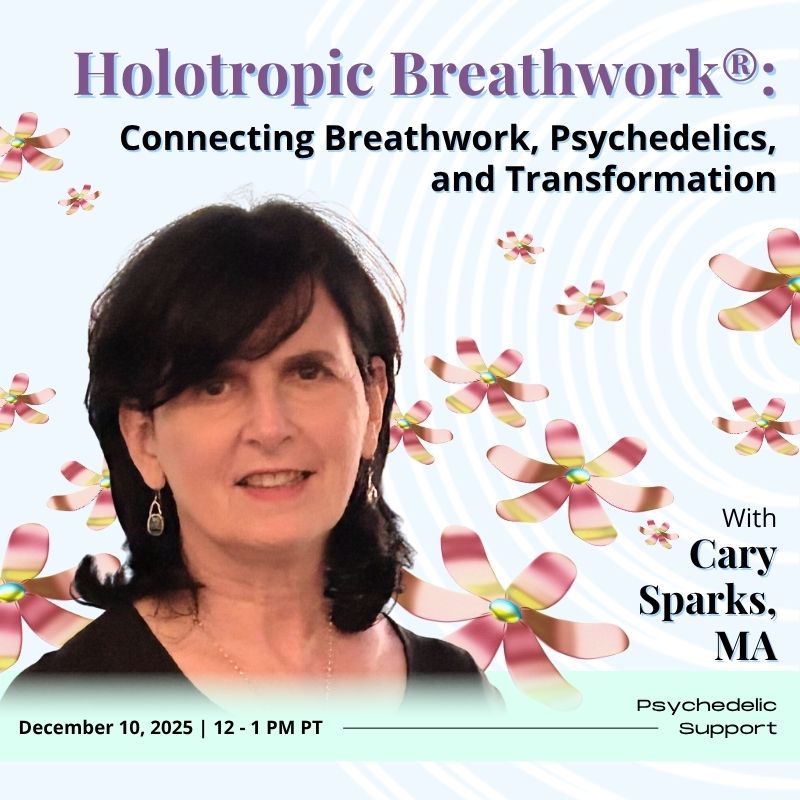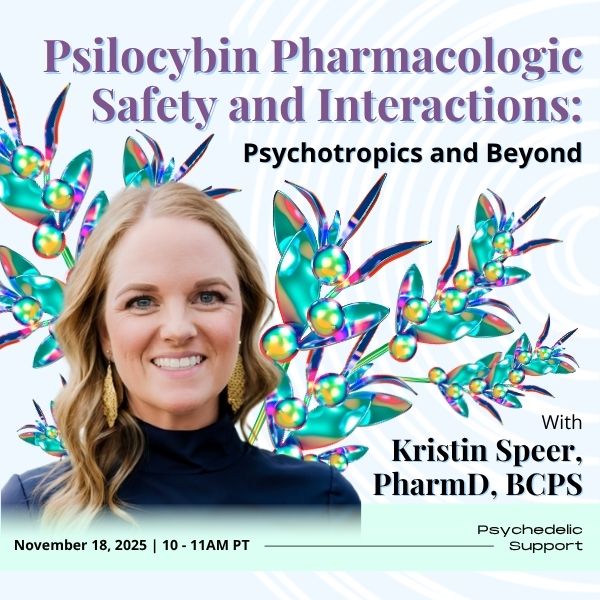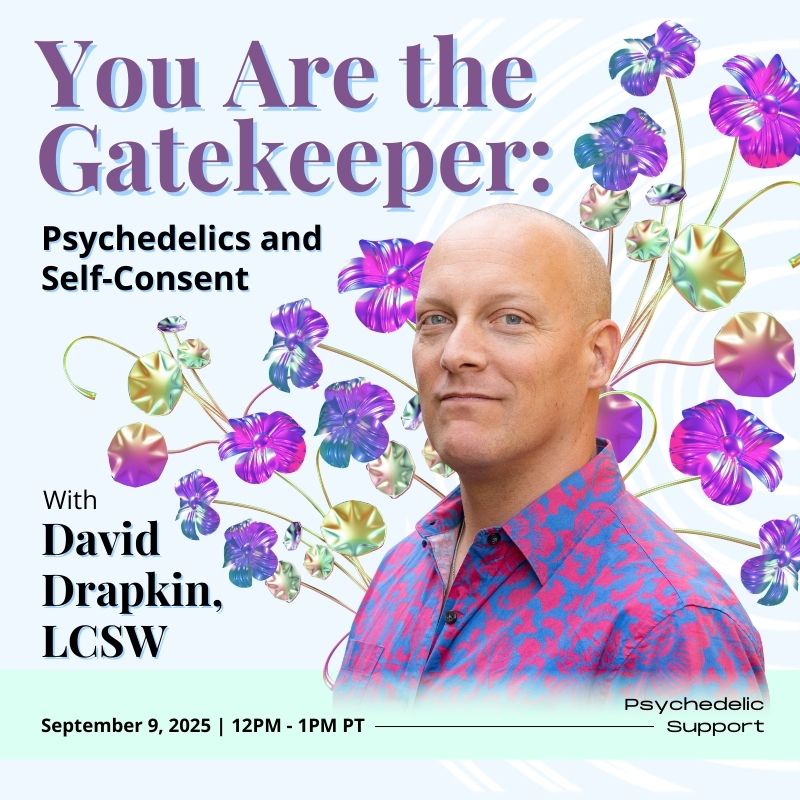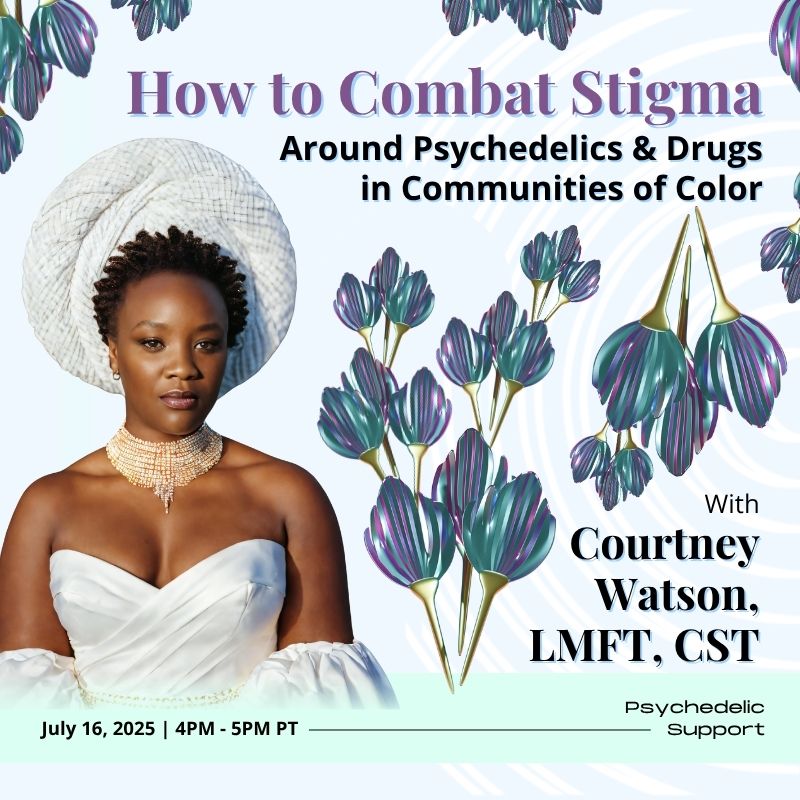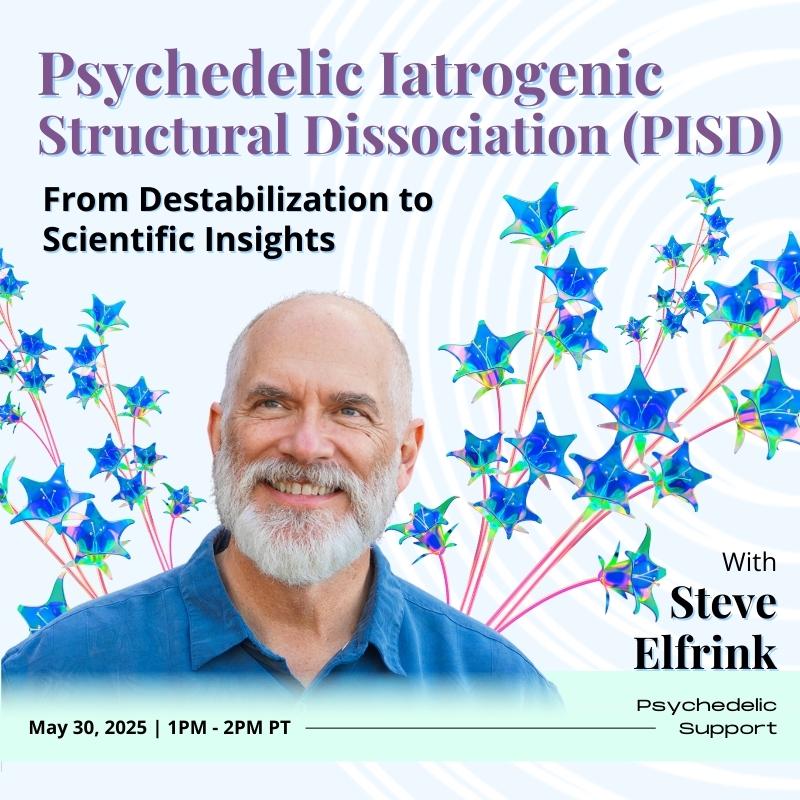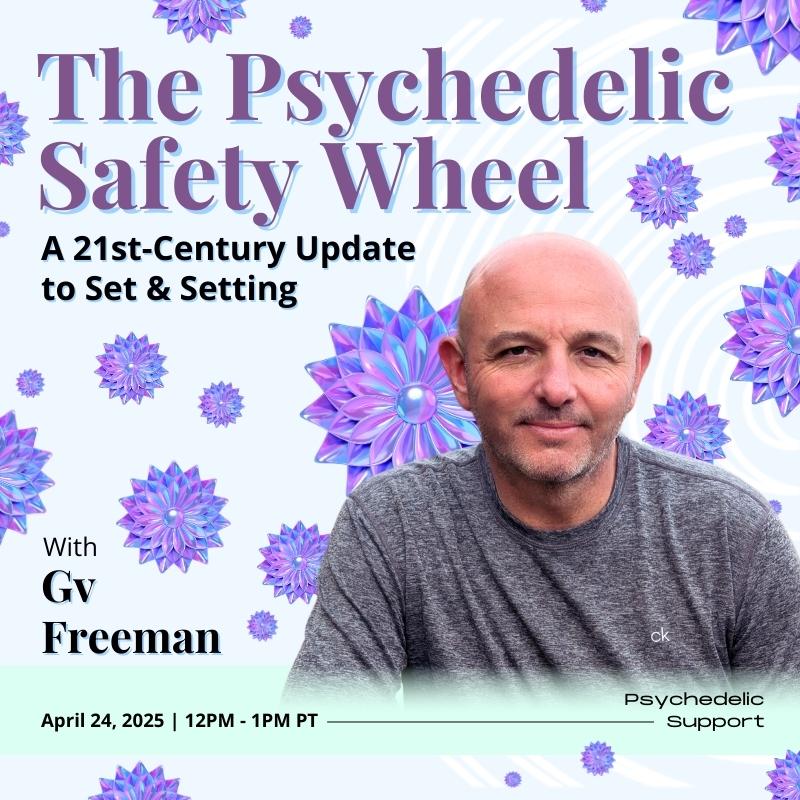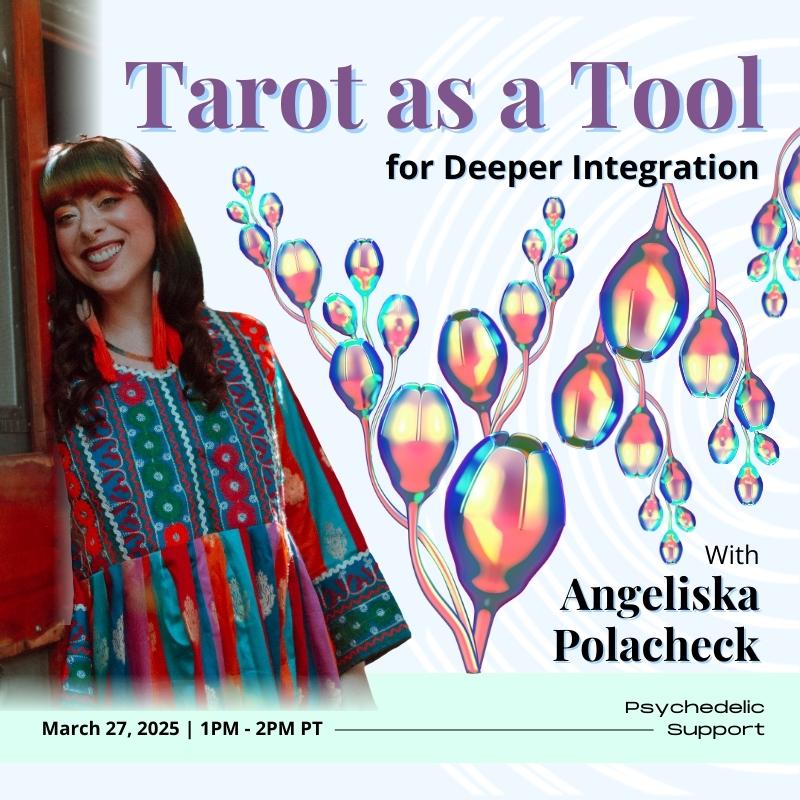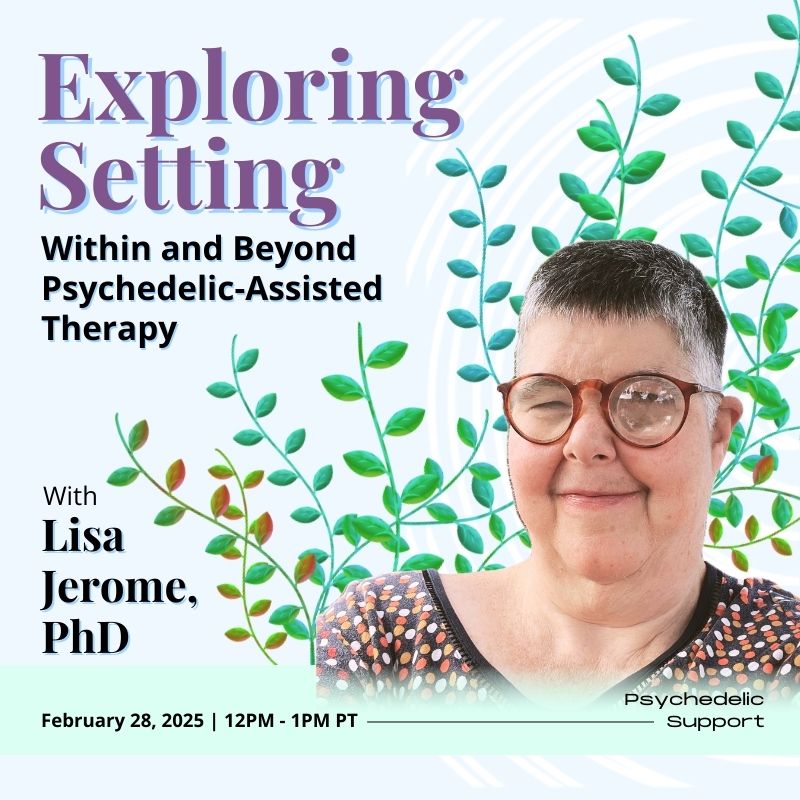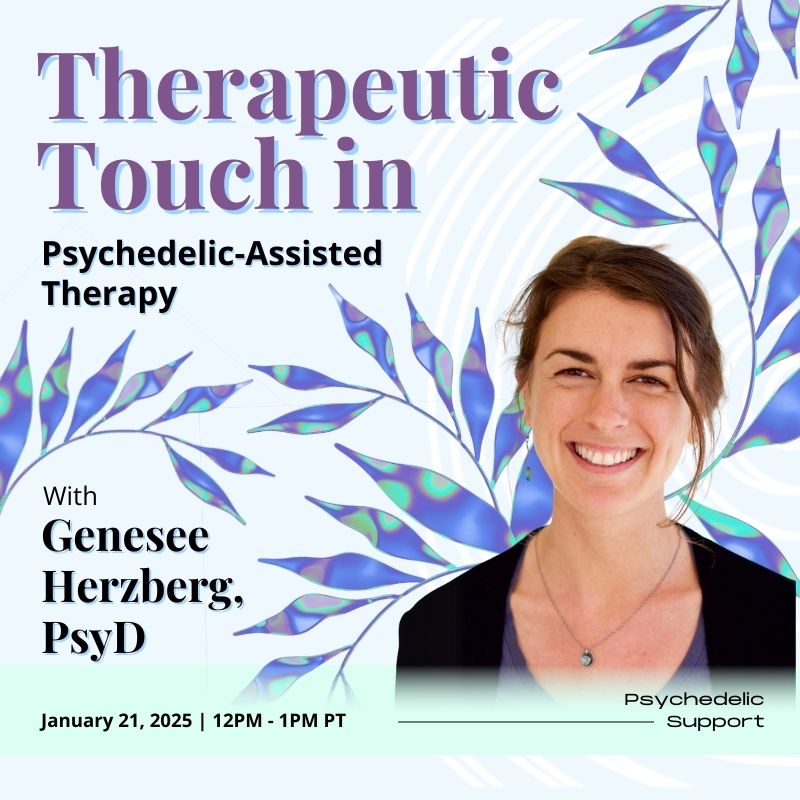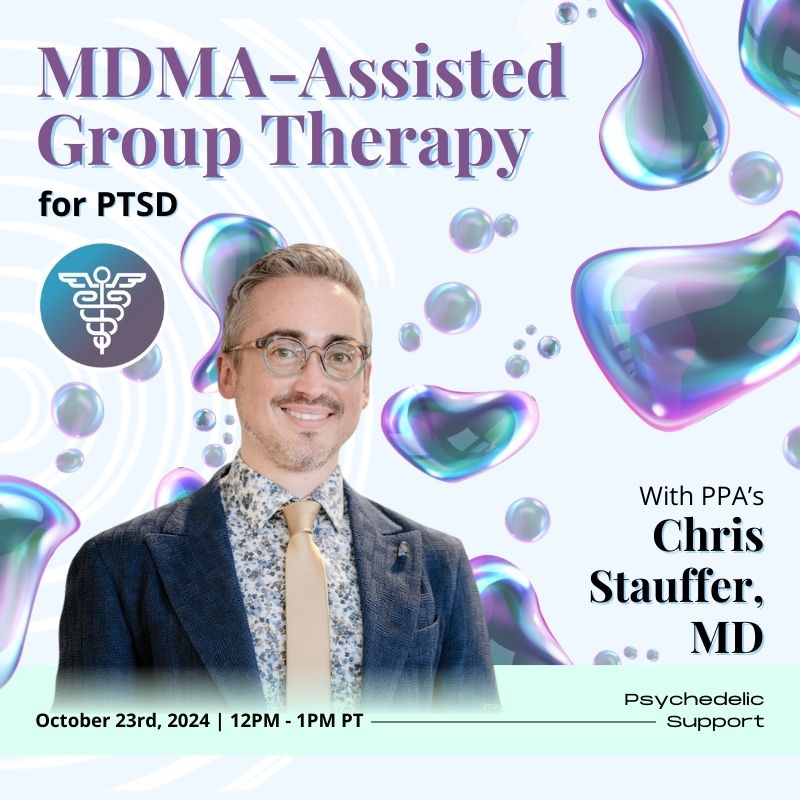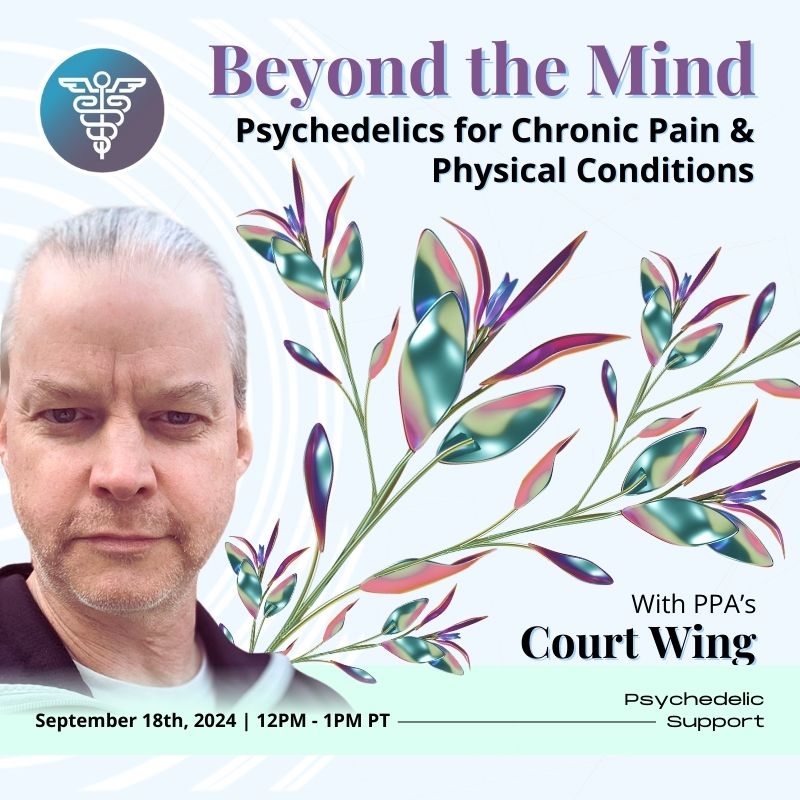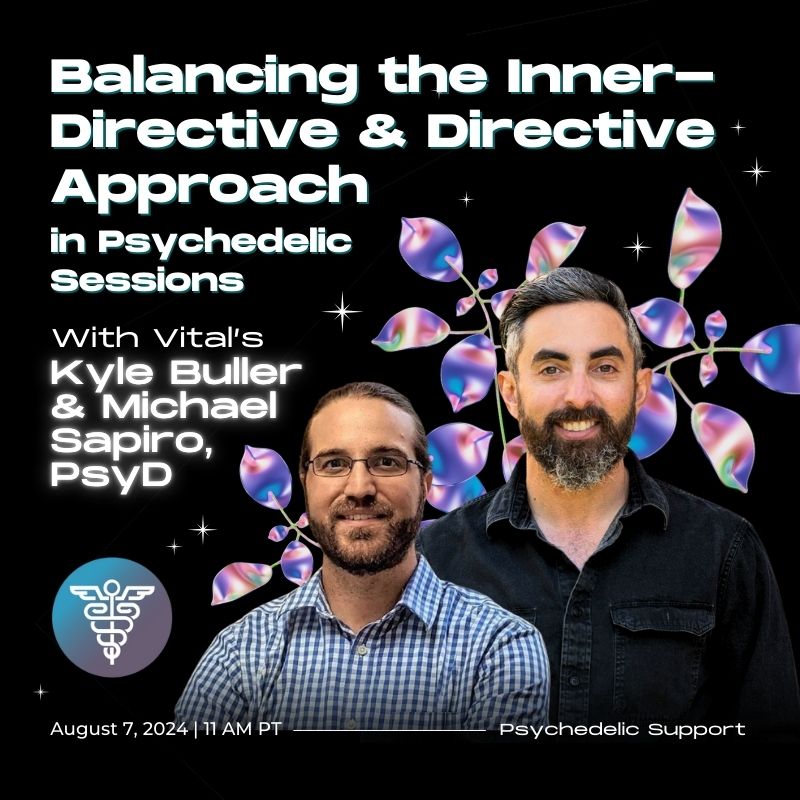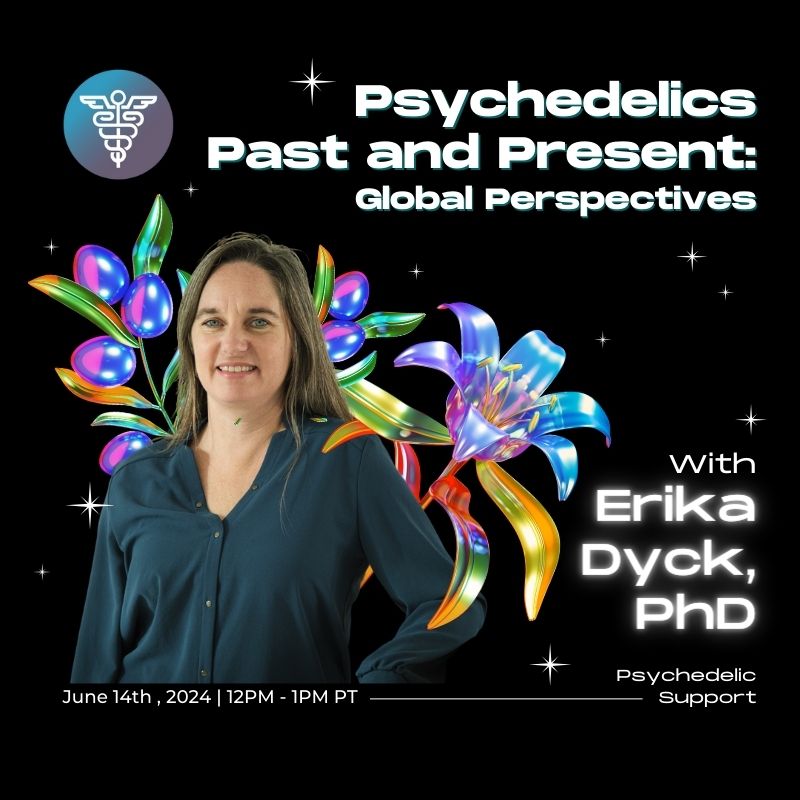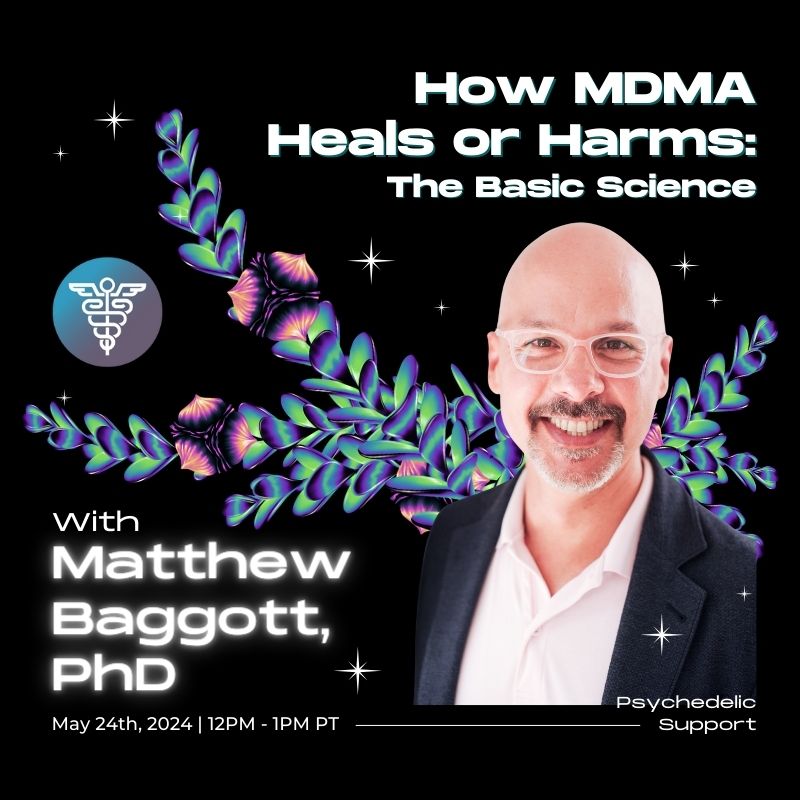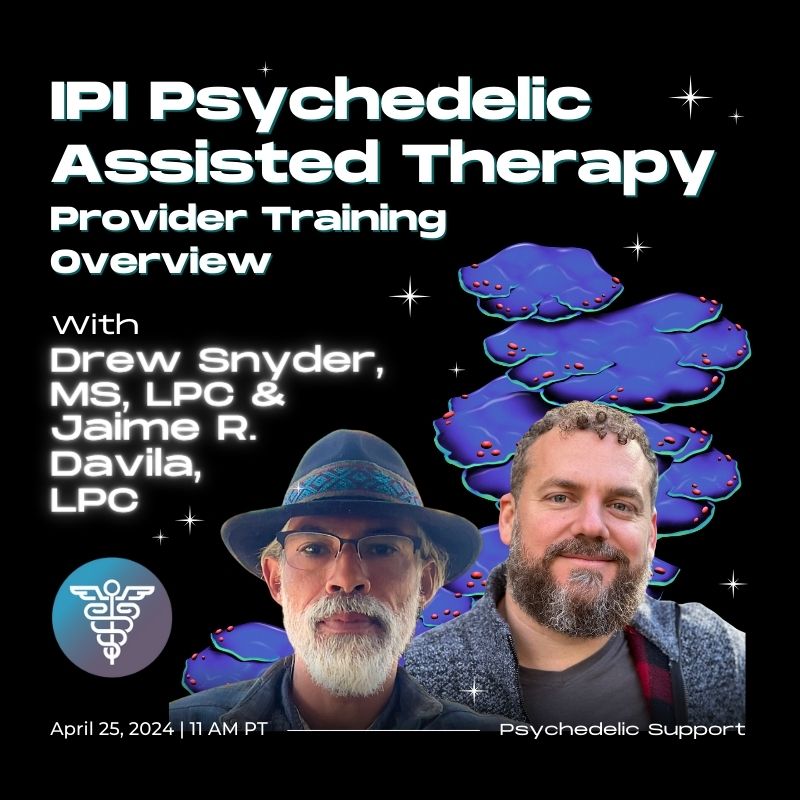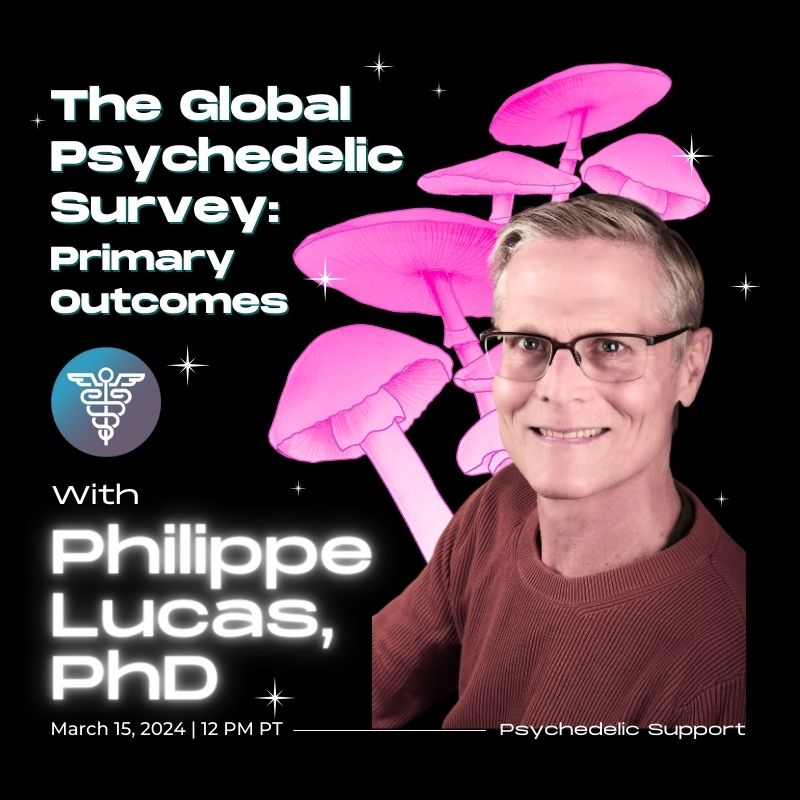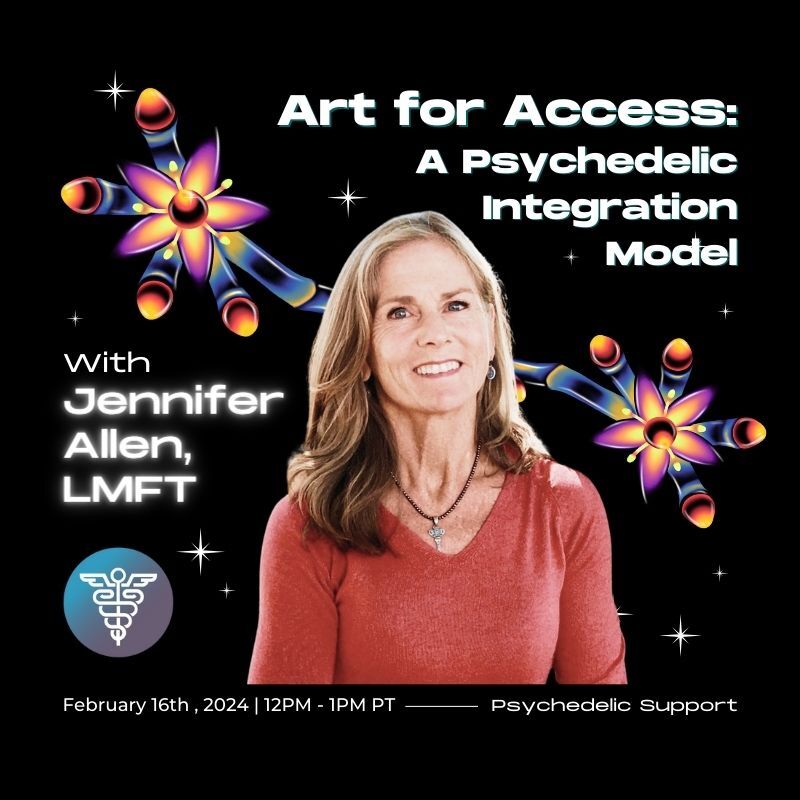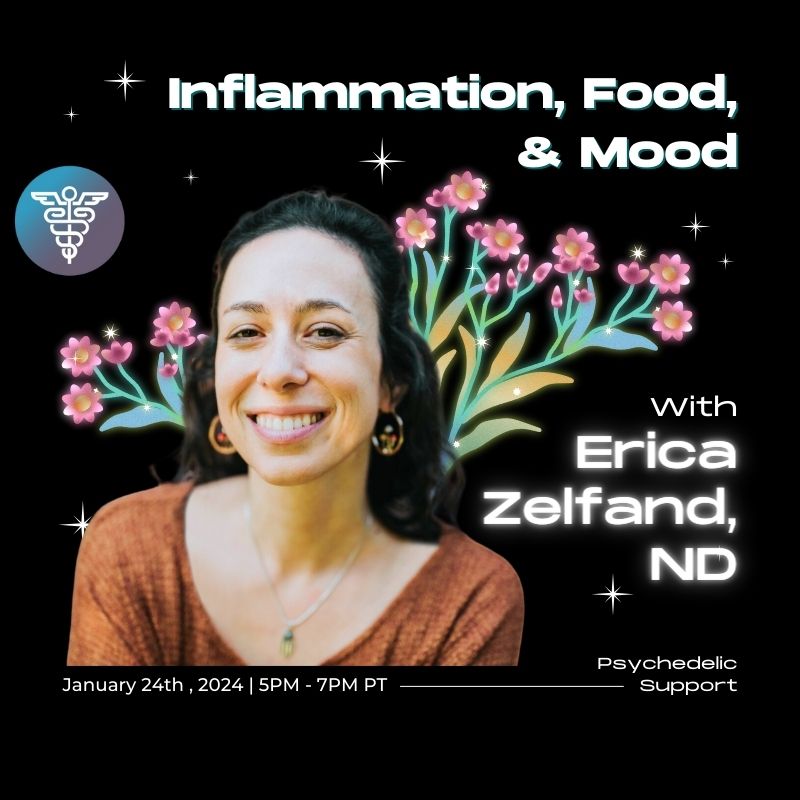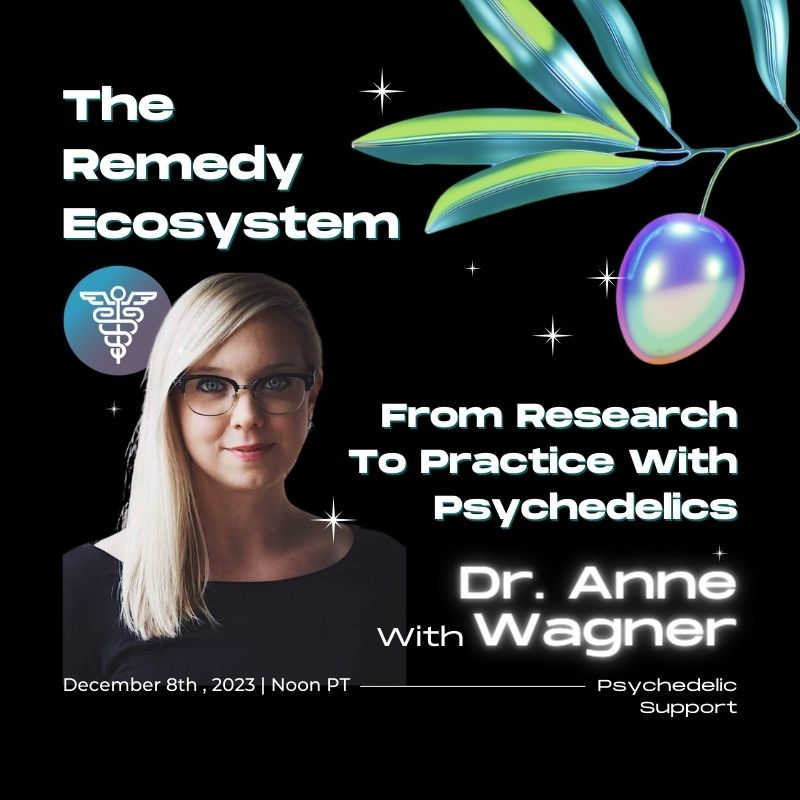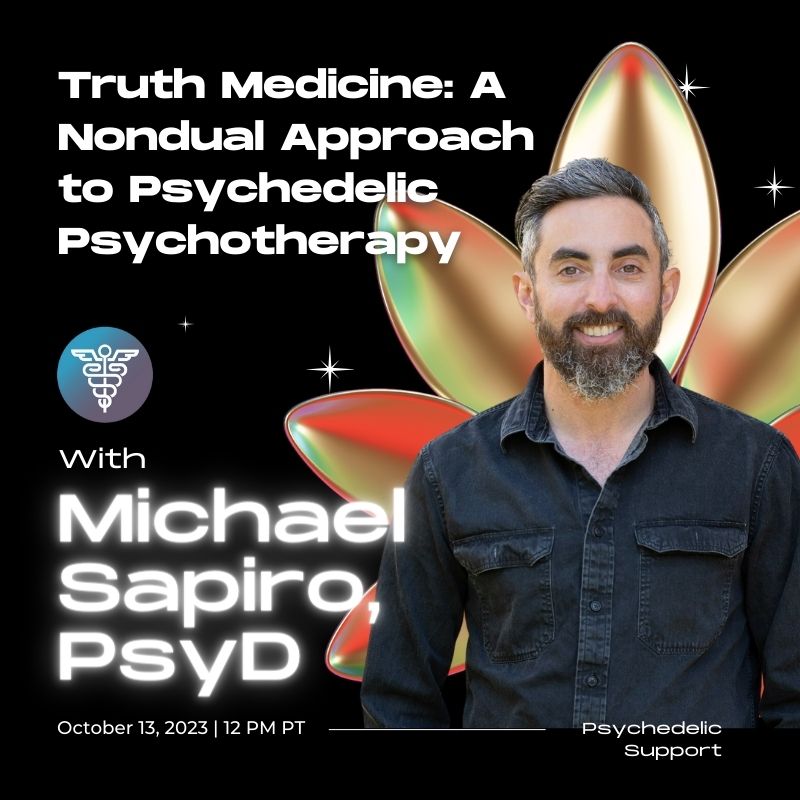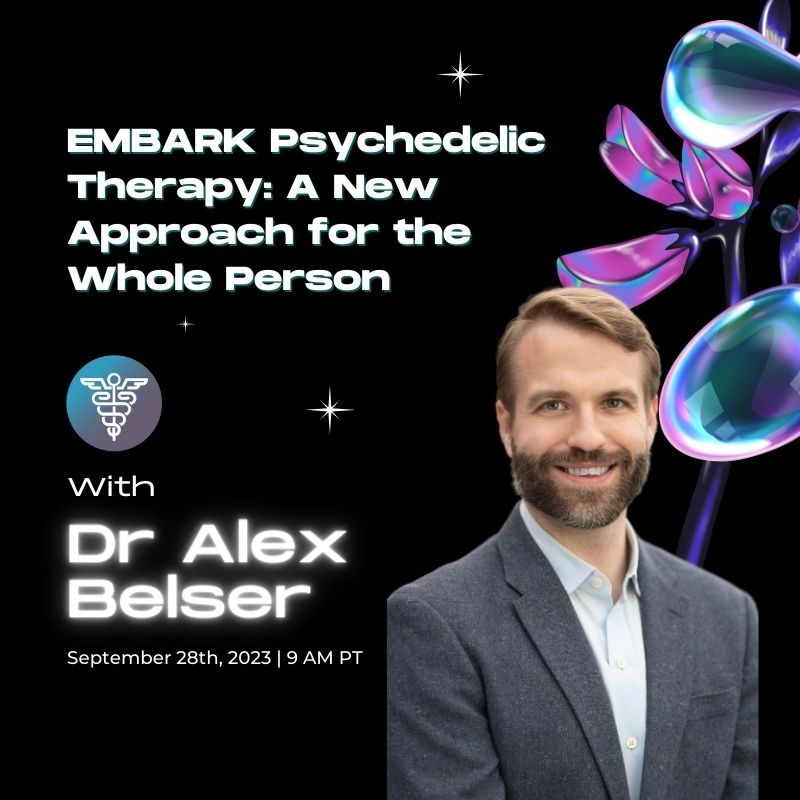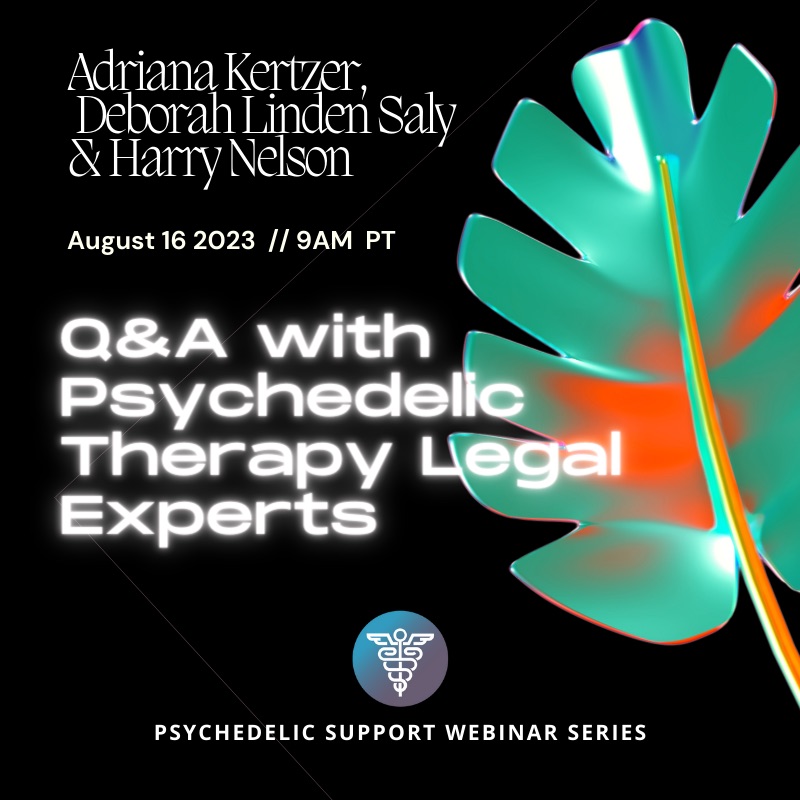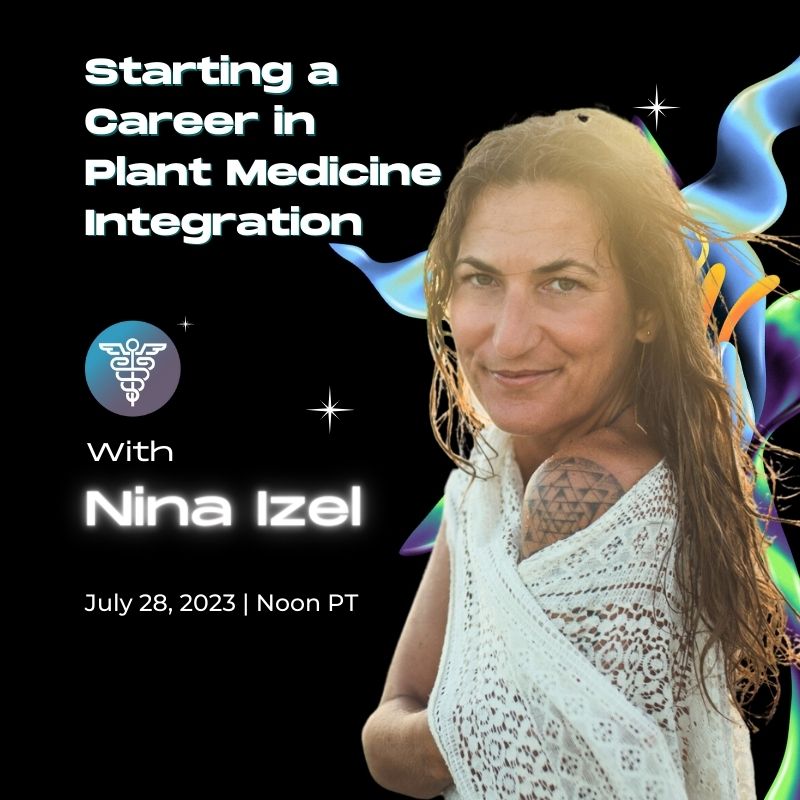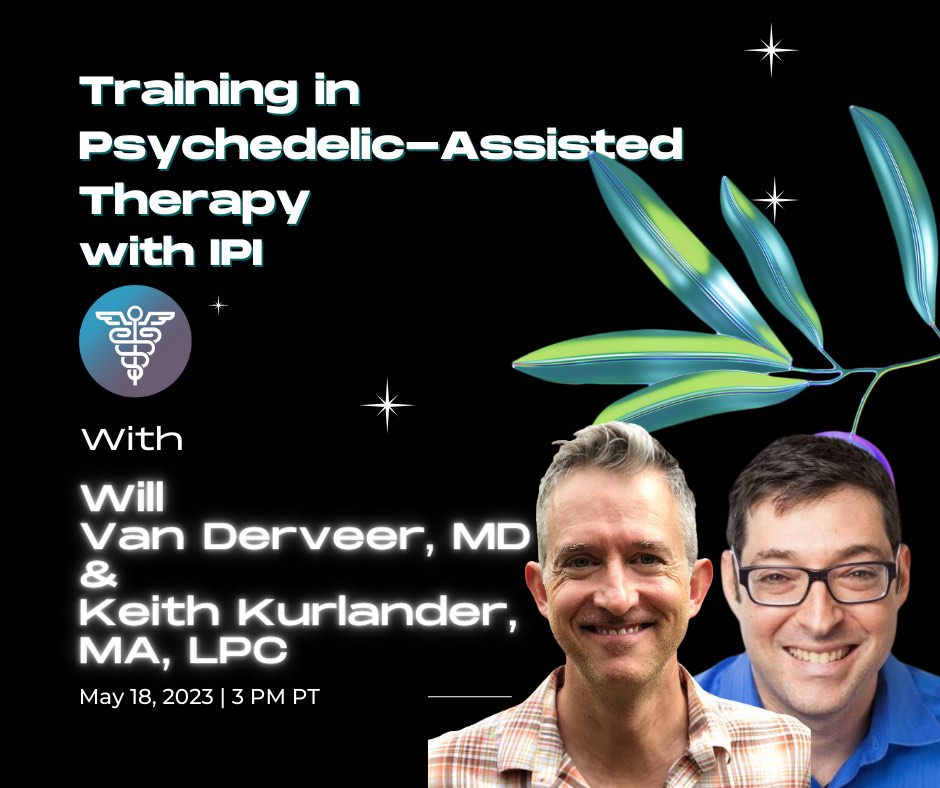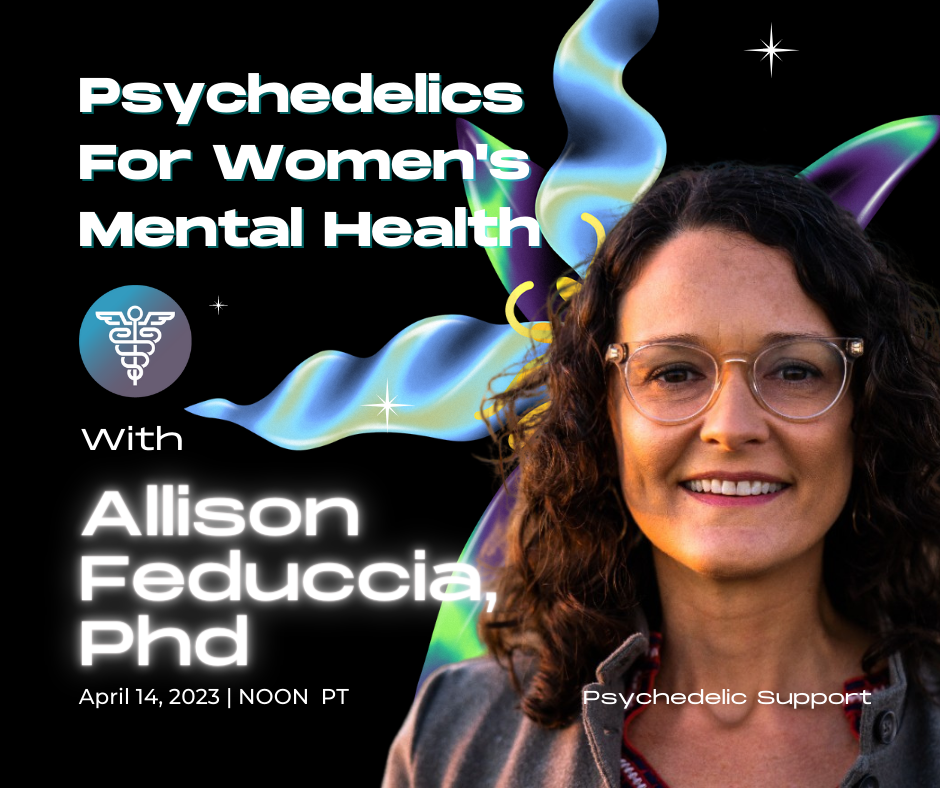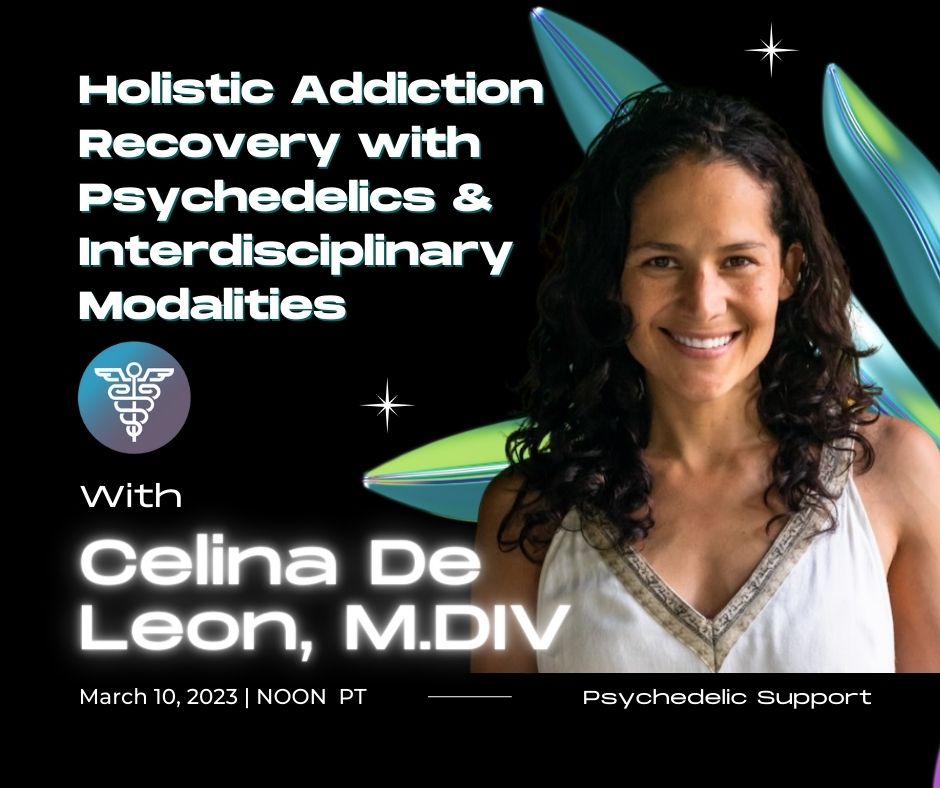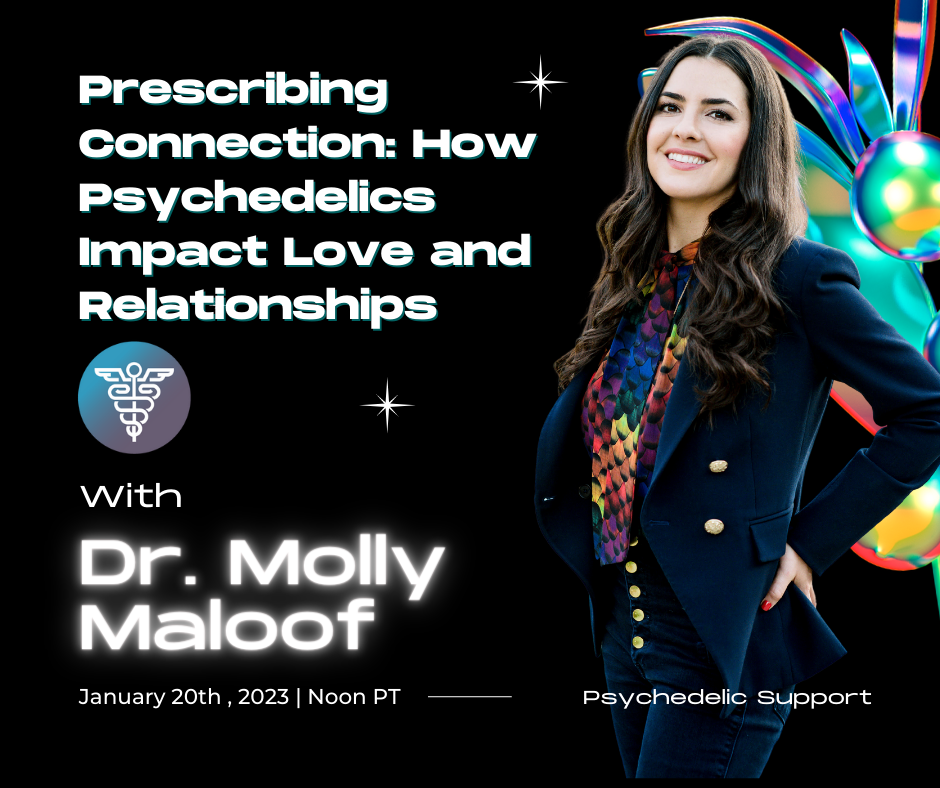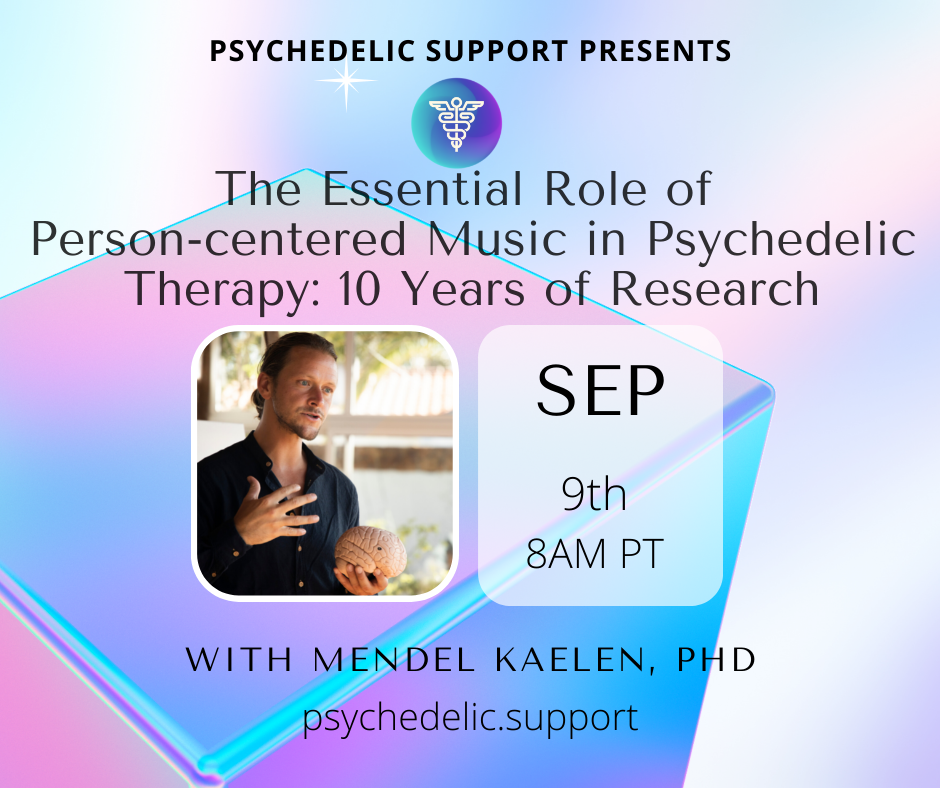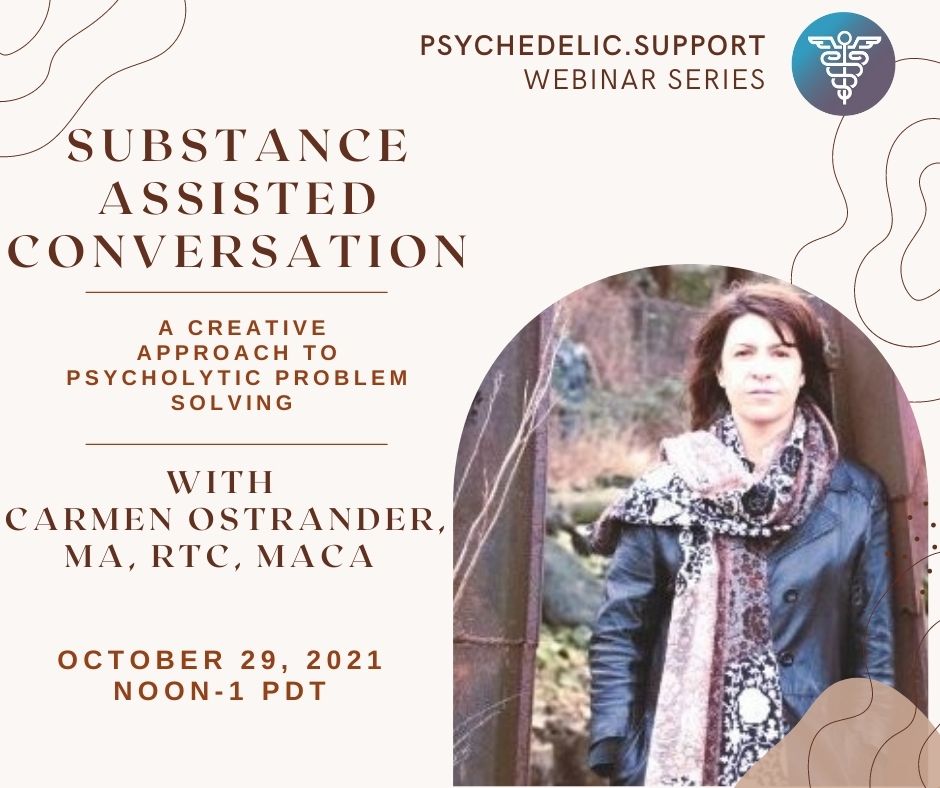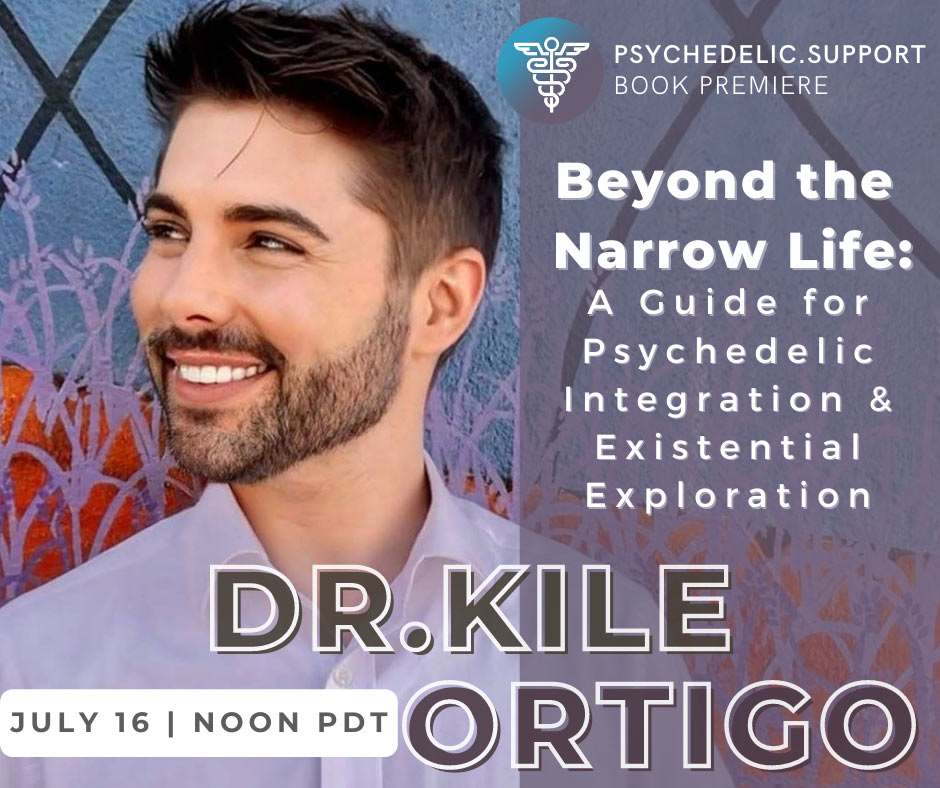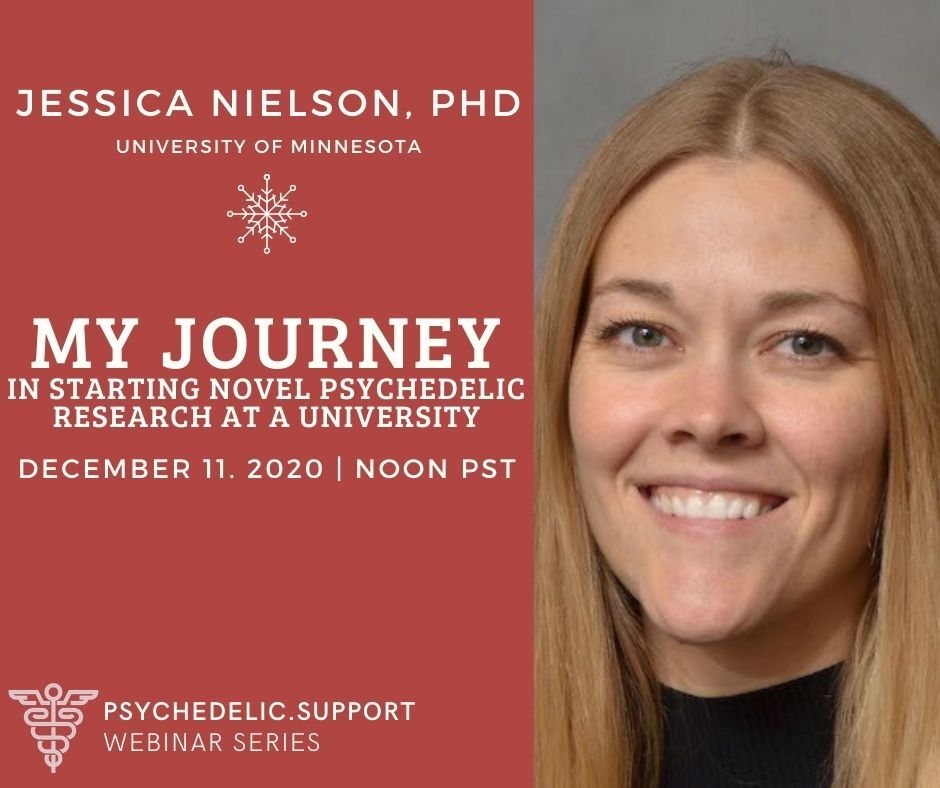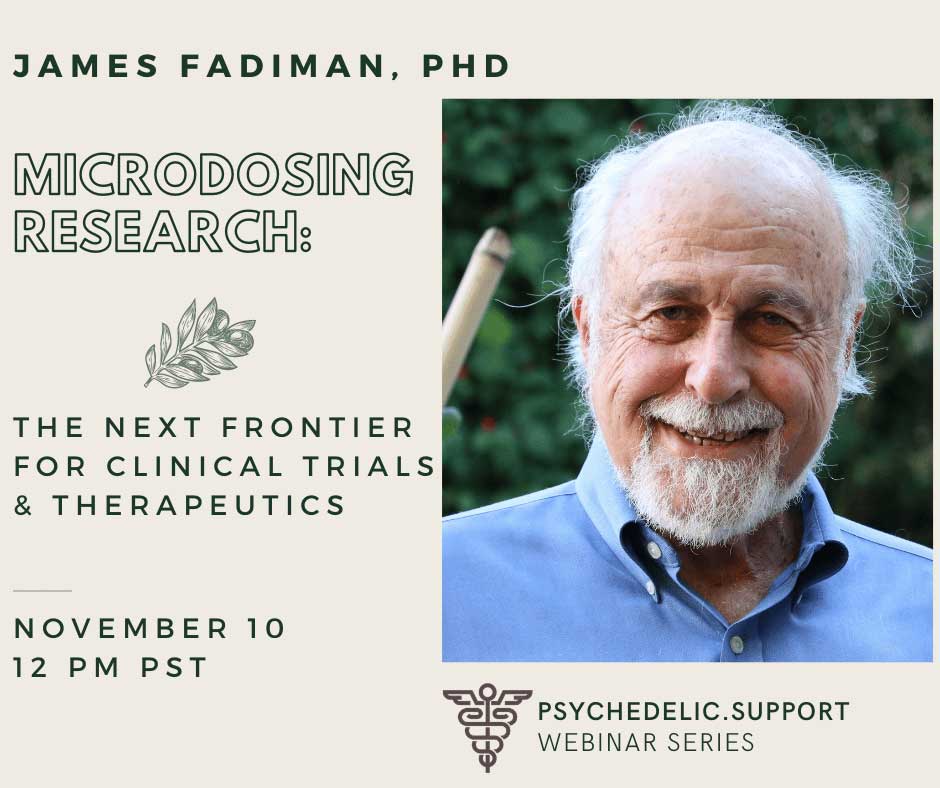Each month, we host a distinguished guest to share information on topics important for the emerging field of psychedelic medicine. We invite questions for our speaker and discussion in the chat to facilitate professional networking in these online webinars. Everyone is invited to attend!
If you are a professional in need of continuing education (CE) credits, go here to access our past and future webinars.
Upcoming Online Speaker Events
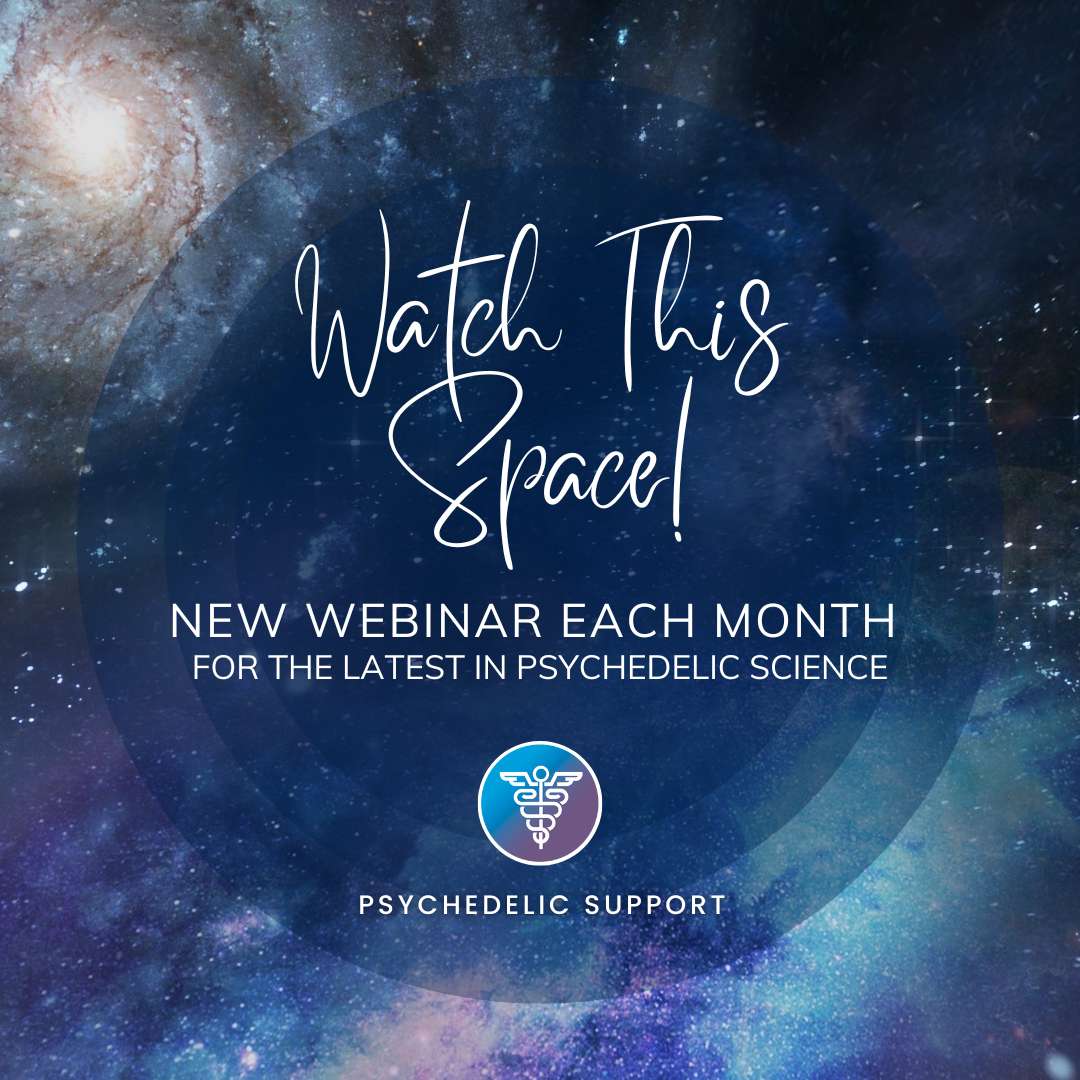
You are invited to our Monthly Speaker & Professional Networking Series, where we host psychedelic experts to share information on specific topics important for the emerging field of psychedelic medicine.
Missed the Live 1-Hour Event? No problem!
Check out our playlist of all Speaker Interviews on YouTube. If you are a professional in need of continuing education (CE) credits, go here to access our past and future webinars.
2025 Past Speakers
This one-hour webinar with Cary Sparks, MA, introduces Holotropic Breathwork® (HB) and its relationship to psychedelic experiences, exploring where the two overlap and where they differ. We’ll look at how HB reliably induces non-ordinary states without substances and why it can be an accessible option for those who cannot or choose not to use psychedelics.
We’ll also discuss how HB supports preparation and integration, key safety considerations and contraindications, and what facilitators should know when offering breathwork in psychedelic-adjacent contexts.
Psilocybin’s safety risks extend beyond psychotropics. Join Psychedelic Support and Kristin Speer, PharmD, BCPS—founder of the Psilocybin Interaction Checker and co-founder of the Psychedelic Pharmacists Association—for this evidence-based session. In it, Dr Speer clarifies psilocybin metabolism and interactions, challenges overstated CYP450 risks, and revisits lithium and seizure data. Case examples illustrate how existing medication profiles can amplify harm, and the session also covers how agents like semaglutide, omeprazole, and immunomodulators affect safety. Learn practical strategies to evaluate evidence and reduce risk.
Consent with a guide is often emphasized in psychedelic spaces, but the deeper process of self-consent is rarely explored. In this webinar, David Drapkin, LCSW, introduces the concept of embodied self-consent—a mindful, somatic practice that helps us listen inward, align with our true needs, and approach psychedelic use with integrity and purpose. Drawing on mindfulness, harm reduction, and evidence-based clinical models, we explore how to become the gatekeepers of our own journeys. This interactive session includes guided reflective writing, offering practical tools for seekers and practitioners alike to deepen self-awareness and strengthen ethical discernment.
Stigma, cost, and systemic barriers continue to limit access to care in communities of color. Join Psychedelic Support and Courtney Watson, LMFT, CST, for this webinar as Courtney—founder of Doorway Therapeutic Services and Access to Doorways—shares insights from running a diverse-staffed clinic facing low demand due to deep-rooted stigma and affordability. We’ll explore drug scapegoating, insurance challenges with Medi-Cal and Spravato, and broader issues like DEI rollbacks, limited diversity in the field, and lack of trust. Learn how we can begin breaking down these barriers to healing.
Psychedelic Iatrogenic Structural Dissociation (PISD) is a new hypothesis rooted in Steven Elfrink’s personal experience of ayahuasca-induced destabilization. Join us for this webinar recording where Elfrink explores how psychedelics can overwhelm trauma defenses without proper support, and why trauma-informed care, pacing, and integration are critical for safe, effective healing.
The Psychedelic Safety Wheel is the first major update to “set and setting” since Timothy Leary coined the term in 1961. Join Gv Freeman and Psychedelic Support to explore this modern, comprehensive model for psychedelic safety.
This presentation covers the 12 spokes of the Safety Wheel, the difference between top-down and bottom-up harm reduction, and how these elements support a well-rounded, intentional approach to healing. Whether you’re a seeker, guide, or clinician, this talk offers valuable insights to optimize safety and transformation.
Tarot is a powerful tool for integrating healing experiences, offering insights long after the journey. By engaging with symbols and archetypes, tarot guides us through the subconscious, revealing wisdom from our psyches and ancestral memories. Angeliska of Sister Temperance Tarot helps seekers interpret these messages, deepening self-awareness and understanding.
Join Psychedelic Support as Angeliska Polacheck explores how tarot complements psychedelic healing. Learn to navigate messages from the major and minor arcana, oracle decks, and your intuition. Bring your deck, a journal, and any questions!
Set and setting play an important role in shaping psychedelic experiences, including in psychedelic-assisted therapy. Set refers to internal factors like personality, mood, attitudes, and goals, while setting includes external factors like physical environment, lighting, sound, and the states and identities of the people present. But what do we really know about setting and its role in PAT? How can we measure it and optimize therapeutic environments? Join Lisa Jerome, PhD to explore setting and its related research, challenges, and tools for measuring it and applying these insights.
Join Genesee Herzberg, PsyD and Allison Feduccia, PhD for a thought-provoking webinar on how ethical touch enhances safety, emotional healing, and trauma resolution in psychedelic-assisted therapy. Learn about setting boundaries, facilitating consent, and integrating touch with real-world examples of its therapeutic impact.
Ideal for therapists, researchers, and anyone interested in advancing psychedelic therapy, this session offers practical insights into the evolving role of touch. Don’t miss it!
2024 Past Speakers
MDMA-assisted group therapy, developed in the 1970s, has evolved with unique characteristics compared to other psychedelic group models.
Join Psychedelic Support and Chris Stauffer, MD, for an insightful discussion on the evolution of MDMA-Assisted Group Therapy for PTSD. Dr. Stauffer compares early practices with current protocols, explores how MDMA influences group dynamics and discusses how this model could expand access to therapy once approved.
Psychedelics are showing promise beyond mental health, offering potential relief for chronic pain and neurodegeneration.
Join Psychedelic Support and Court Wing, founder of REMAP Therapeutics and co-founder of the Psychedelics & Pain Association, to explore how psychedelics can address tough physical conditions like neuropathic pain and fibromyalgia. Discover key research, case studies, and best practices for using psychedelics in pain management.
The Inner-Directive model is foundational in many psychedelic-assisted protocols, emphasizing the “intrinsic healing” of the client’s psyche, also known as the “Inner Healing Intelligence” by Stan Grof. While this model is key to protocols like the MAPS MDMA therapy manual, there may be times to include more Directive approaches.
Join Kyle Buller, MS, and Michael Sapiro, PsyD, as they review the Inner-Directive approach, compare it with directive frameworks, and present a new model with case study examples.
As psychedelic substances enjoy a resurgence in clinical and popular discussions, their once-maligned reputation is changing. Popular books, documentaries, and social media tout the benefits of psychedelics, while clinical studies report breakthroughs in mental health treatments.
This enlightening presentation with Erika Dyck, PhD, takes us on a journey through the history of psychedelic studies, highlighting the highs and lows that have led to this renaissance moment and examining the methods and approaches that have been celebrated or demonized along the way.
MDMA may become an approved medicine in the United States this year. Yet science is still working to understand the mechanisms of its therapeutic effects and its side effects.
Join Matthew Baggott, PhD, and Psychedelic Support to review studies in healthy volunteers, animals, and cells that shed light on these mechanisms, including new data on novel molecules that seem to retain MDMA’s core therapeutic effects while potentially decreasing side effects.
Discover the ins and outs of IPI’s Psychedelic-Assisted Therapy Training Program with Jaime R. Davila, LPC, and Drew Snyder, MS, LPC.
Explore the program’s structure, requirements, and comprehensive curriculum covering psilocybin, ketamine, and MDMA therapies. Gain insights into the training format, including lectures, group discussions, and hands-on psilocybin and ketamine practicum experiences. Plus, find out how this training can pave the way for eligibility as a licensed psilocybin services facilitator in Oregon.
Explore the latest insights into global psychedelic use with esteemed researcher Philippe Lucas, PhD, and Psychedelic Support. Leading a survey with 6,379 participants, Philippe unveiled key trends, showcasing psilocybin as the most used psychedelic (75.3%). Fueled by “personal growth” (85.1%) and “general well-being” (68.7%), the survey reveals 60% engaging in therapeutic use, offering valuable insights for public health, substance use, and psychedelic-related policy development.
Watch this FREE, concise, and insightful exploration of naturalistic psychedelic experiences with global implications.
Embark on a transformative journey into the heart of psychedelic integration with Psychedelic Support and Jennifer Allen, LMFT, ATR-BC. The integration model Jennifer has developed, Art for Access, comes out of her work with dreams, shamanic drum journeys, and her art therapy background. By accessing a potent aspect of the expanded state/journey as a portal, the drum journey allows the process to unfold further, and image-making acts as a bridge to ordinary consciousness.
Jump into this FREE experiential webinar on Art for Access.
Hippocrates said, “Leave your drugs in the chemist’s pot if you can heal the patient with food.” This includes psychedelics! While often seen as a universal remedy for mood issues, psychedelics have limited effectiveness. Recognizing the complexity of mental health, we explore the causes of psychological problems and how nutrition can deeply and sustainably address them. Research suggests combining psychedelics with other healing methods for optimal results.
Join Erica Zelfand, ND, to discover how food can enhance mental health and psychedelic medicine outcomes.
2023 Past Speakers
Join Dr Anne Wagner to explore Remedy Institute’s sustainable program for psychedelic research and practice. They conduct clinical trials with MDMA to treat PTSD in individuals and couples. Dr. Wagner discusses Remedy’s ecosystem model, studies, and the promise of relationally-based healing with psychedelics in this webinar.
Listen to this conversation with Dr. Anne Wagner and Psychedelic Support.
Discovering, accessing, and applying love toward one’s self is the essence of the nondual approach to psychedelic psychotherapy. In this approach, we start from this place of innocence, ease, and peace and work our way through the layers of trauma, shame, and untended grief with love as the healing balm.
Join Michael Sapiro, PsyD, as he walks us through this approach.
EMBARK Psychedelic Therapy for Depression: A New Approach for the Whole Person is a comprehensive guidebook for clinicians that presents a novel therapeutic framework for administering psychedelic medicines. The EMBARK model was developed in response to the growing interest in psychedelic medicines for treating mental health disorders, particularly depression, and the identified gaps in existing models of psychedelic-assisted therapy (PAT).
Join Dr. Alex Belser, PhD, and learn about the model’s six Clinical Domains and therapeutic change mechanisms for depression treatment.
The legal landscape of psychedelic therapies has been evolving rapidly. As scientific evidence grows, governments are reevaluating their policies, aiming to strike a balance between patient safety and expanding the potential benefits of psychedelic-assisted therapies.
Listen to a Q&A about the current issues around legal access to psychedelic therapy with Adriana Kertzer, JD, Deborah Linden Saly, JD, and Harry Nelson, JD. These expert attorneys discuss navigating legal challenges around plant medicines and how to become better informed to practice in this emerging psychedelic medicine field.
Psychedelic integration is a newly emerging field with worldwide potential. Learning how to educate yourself, finding professional training while building your support system in the psychedelic community, and navigating personal psychedelic experiences are vital to those working in this field.
Join us for a discussion about the five steps you need to take to become a professional plant medicine integration facilitator with Avatar Healing Arts founder and integration specialist Nina Izel. Explore Nina’s 15-month 300+ hour Ayahuasca Integration Facilitation Training Program.
Are you interested in becoming a certified provider of psychedelic-assisted therapy?
As a clinician, there are many considerations to be aware of before enrolling in a psychedelic training program.
Join us for a discussion about psychedelic training opportunities with Integrative Psychiatry Institute’s Co-Founders Keith Kurlander, MA, LPC, and Will Van Derveer, MD. We explore the curriculum of the year-long online program offered by IPI and answer your questions about how to apply this training to your clinical practice.
Family members and/or close others represent an often-untapped resource for enhancing change in individuals engaged in psychedelic psychotherapy. Providing a supportive other with an active role in the healing process can also decrease their feelings of anxiety, powerlessness, and even paralysis states that can contribute to systemic difficulties, especially as the healing work disrupts old patterns.
Clinical psychologist and psychedelic research scientist Adele Lafrance, PhD, gives a presentation on the ethical, neurobiological, and psychological considerations for supporting others’ involvement in psychedelic-assisted healing.
Join Psychedelic Support co-founder and neuropharmacologist Allison Feduccia, PhD, for a presentation on the science of hormones and neurotransmitters, health challenges across the life cycle, and why psychedelic medicines could become treatment options for premenstrual symptoms, sexual health, postpartum depression, menopause, and end-of-life care.
Learn the research behind these advances and takeaways for women who are searching for healing through psychedelic medicine.
Join Psychedelic Support and Celina De Leon, M.Div, for a conversation about why entheogenic plant medicines such as ayahuasca–when combined with other therapeutic and recovery modalities—can be effective in ways that conventional approaches may not be.
We discuss how addiction is a complex condition of body, mind, human relations, and spirit. In the pursuit of reward—the relief of pain, unresolved emotional experiences, and trauma—the elements of nature, nurture, and choice become tragically misaligned.
Watch a conversation with Dr. Darron Smith, MAPS-trained therapist, physician’s assistant, educator, and researcher, about anti-racist considerations for psychedelic-assisted therapists (PATs) to practice when holding space for Black, Indigenous, and People of Color.
Here, we discuss how microaggressions and biases continue to inform how white people show up to interact with BIPOC individuals in the emerging field of psychedelic therapy.
When was the last time you thought about how your social life, your sex life, your romantic life, and your family life affect your health and happiness? There’s a lot of talk about the loneliness epidemic, but what if the real epidemic lack of social connection?
Listen to Dr. Molly Maloof, healthspan, wellness expert, and founder of Adamo Biosciences, discuss the role psychedelics play in enhancing social connection and the ethical challenges with using psychoactive substances in couples’ therapy.
2022 Past Speakers
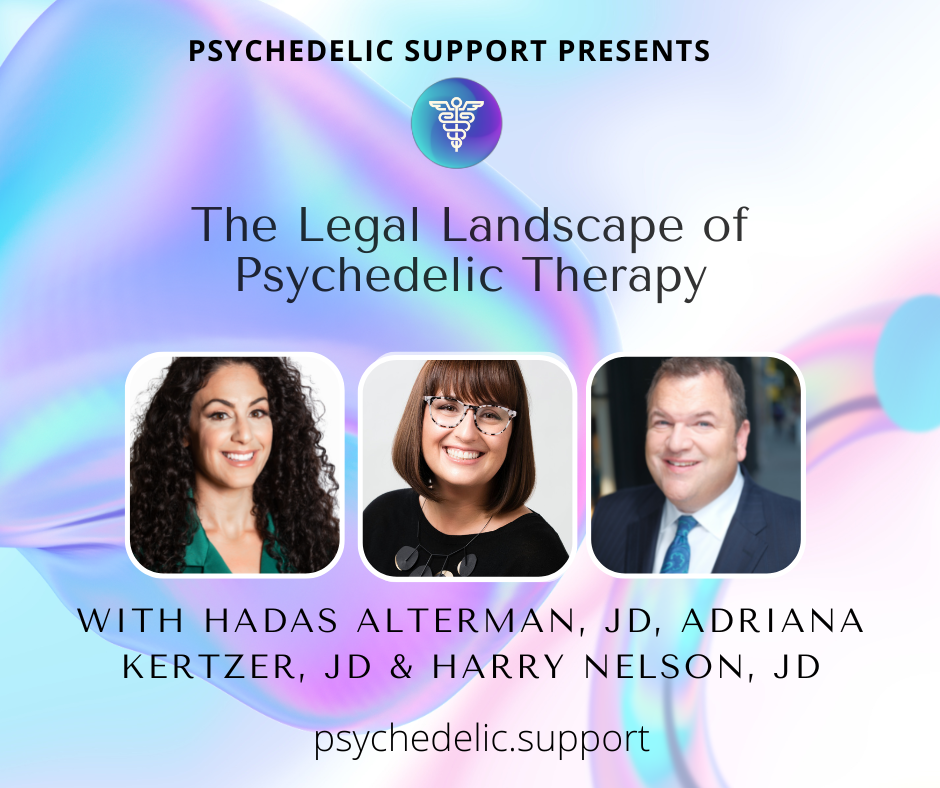
Here is a QA with expert attorneys Adriana Kertzer, JD; Hadas Alterman, JD; and Harry Nelson, JD about the current legal landscape of psychedelic medicine and how it applies to clinical practice.
The psychedelic renaissance, and the legality of these medicines, is rapidly changing.
Therapists, clinicians, providers and policymakers must remain conscientious of this fast moving world.
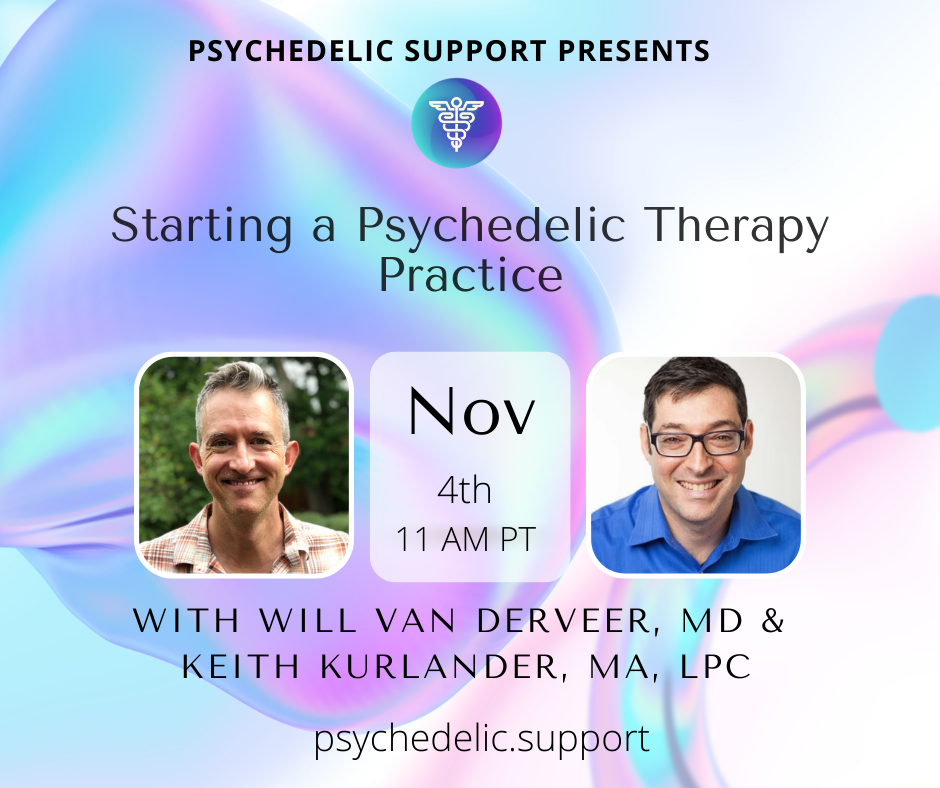
Starting a psychedelic practice can feel overwhelming. As a therapist there are many considerations to be aware of including medical safety, the role of prescribers and therapists, insurance, training, ethics, set and setting, and more.
Here is a discussion about how to get involved with psychedelic therapy as a therapist with Integrative Psychiatry Institute’s Co-Founders Keith Kurlander, MA, LPC and Will Van Derveer, MD. We will explore the the do’s and don’ts, and where to start in the psychedelic therapy space.
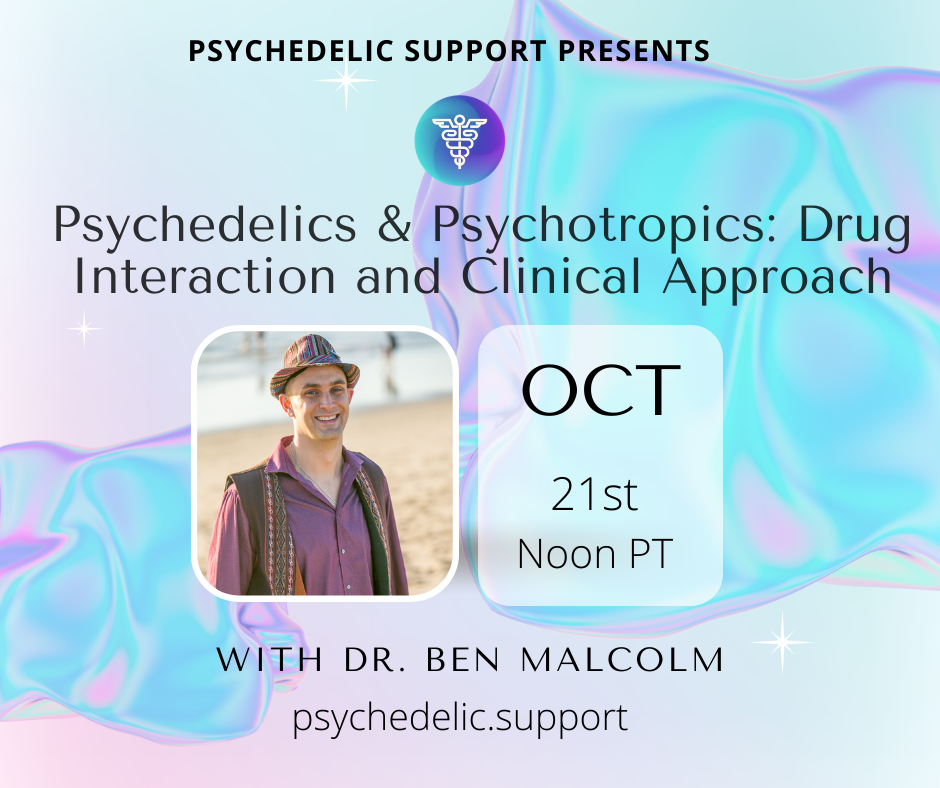
Do you understand how psychedelics and psychiatric medications interact?
Several psychedelic substances are in late-stage clinical trials. It’s important for clinicians to understand clinically significant drug interactions.
Here is a discussion about drug interactions that are likely to significantly influence the safety and efficacy of psychedelic therapies with leading educator, psychopharmacological consultant, and Spirit Pharmacist Ben Malcolm, PharmD, MPH, BCPP.
Music plays a critical role in psychedelic therapy.
In psychedelic-assisted therapy, the experience of music can facilitate implicit learning. We look at patient experiences and musical examples used by Dr. Mendel Kaelen and Wavepaths to create immersive sound experiences that facilitate safe, ethical, and effective therapy sessions. Level up the experience with person-centered music in your psychedelic therapy practice. Expore Wavepaths (10% off with PSPARTNER10).
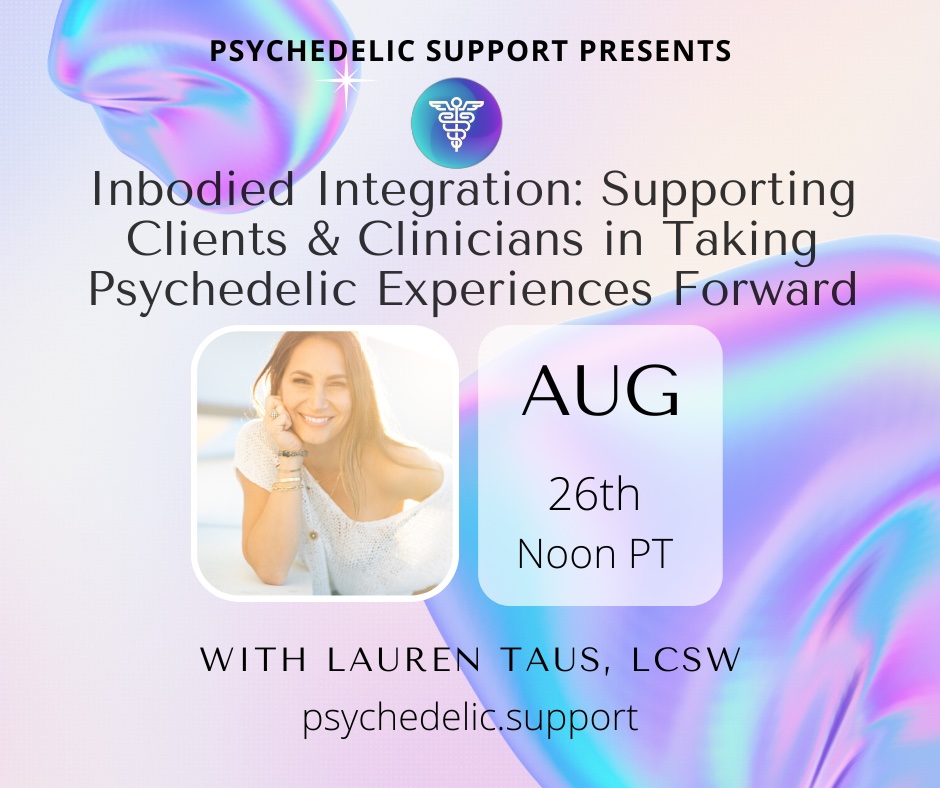
Integration is the name of the game with psychedelic-assisted therapies – and in any enriching experience with a psychoactive medicine. In order to effectively support others in living the truths that emerge from journeys, every clinician in the field must know the landscape of the medicine that they facilitate, from their own psyche, and know how to make action oriented meaning of what one learns in these spaces.
Lauren Taus, LCSW engages a creative, integrative approach to anchor the good of psychedelic experiences, to encourage the active shifts and shed required to make meaningful changes aligned with the highest good for each individual on the path to more freedom, aliveness and joy.
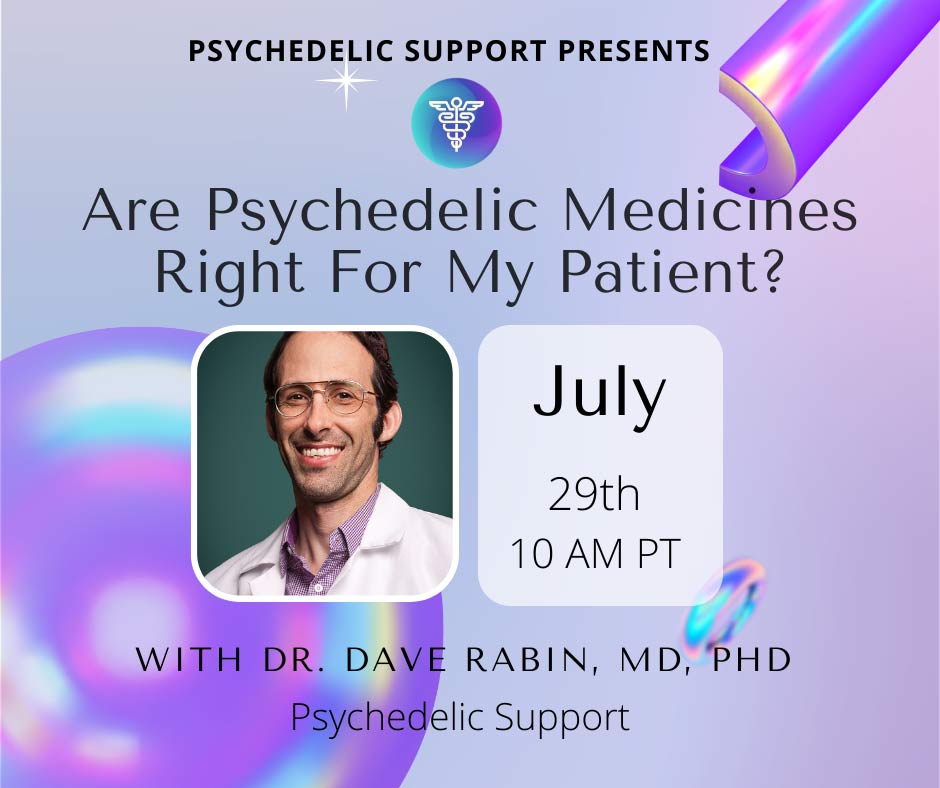
Clinical trials of MDMA- and psilocybin-assisted therapy are investigating these as novel treatments. Ketamine is currently prescribed. As we anticipate the future of psychedelic medicine, how will clinicians decide what is the best and safest treatment for their patient?
Watch a talk around the future of psychedelic medicine in clinical practice with board-certified psychiatrist, health tech entrepreneur, and inventor, Dave Rabin, MD, PhD. He shares what’s known for safety and effectiveness for patients when it comes to utilizing ketamine, MDMA, and psilocybin. Learn about the effects and safety, screening practices, and how to evaluate risk factors.
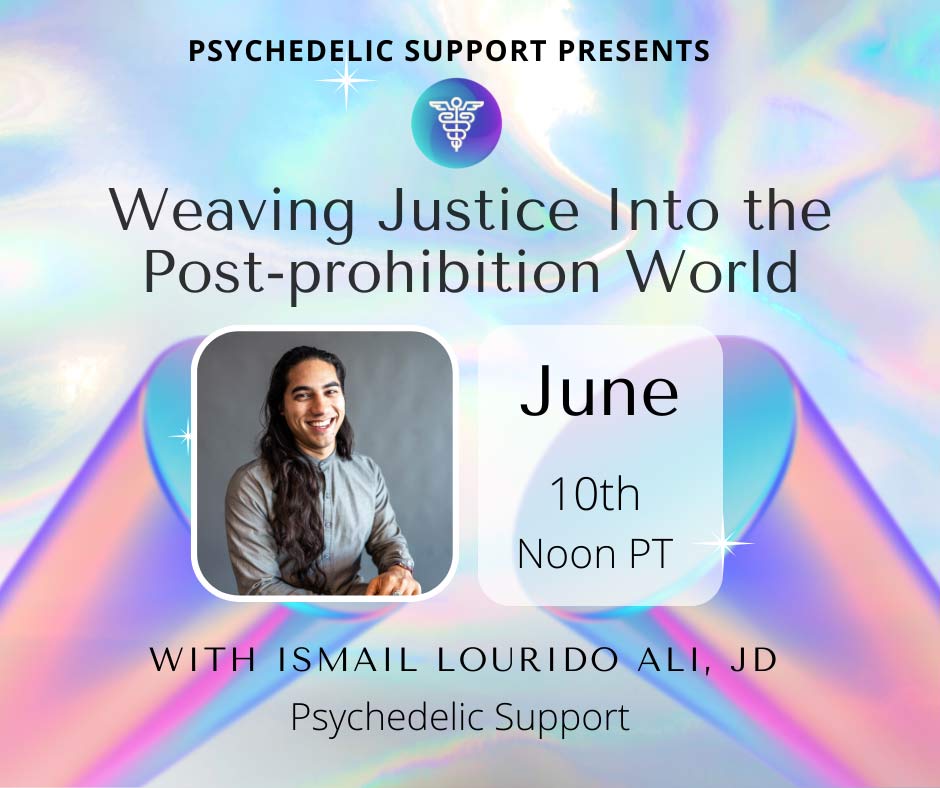
Novel ideas for psychedelic policy reform that were once mere concepts are rapidly becoming more tangible and concrete, and are starting to be introduced and implemented in cities and states across the country. What is the difference between these approaches, and is any one path to psychedelic policy better than the others? Can the approaches to policy reform be harmonized and if so, how? Evidence nor the scientific literature support this.
Watch a practical and dynamic conversation with MAPS Director of Policy & Advocacy, Ismail Lourido Ali, JD. Hear about the landscape of the national psychedelic reform ecosystem and frameworks for analysis and engagement that play an important role in the future of psychedelic medicine.

Common practice is to tell patients on SSRIs and other prescription drugs that they must stop taking their psychiatric medications before they can safely take psilocybin, but neither anecdotal evidence nor the scientific literature support this.
Watch a presentation with integrative mental health professional and psychedelic facilitator, Dr. Erica Zelfand. She details the interplay between antidepressant medication and psilocybin.
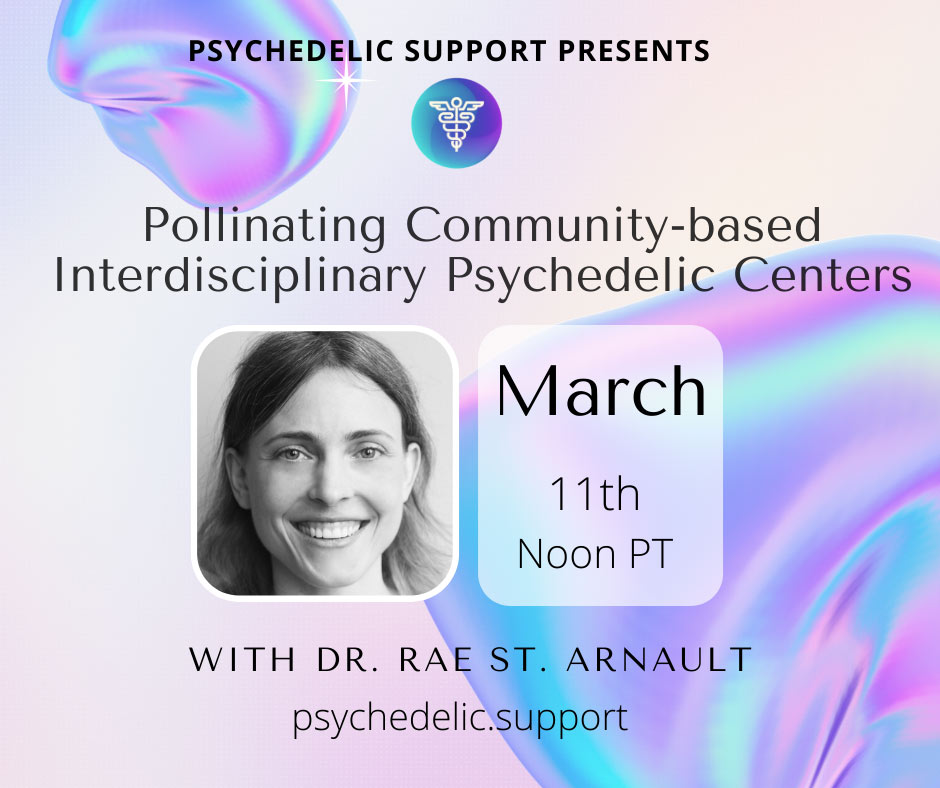
Casting a net in the fast-paced landscape of psychedelics calls for clinicians to better understand the ways in which systematic business planning can create sustainable clinics and centers for decades to come.
Join for a discussion with physician and psychedelic industry expert Dr. Rae St. Arnault. We’ll explore areas of strategy and expertise needed for clinicians to build strong community-based psychedelic and ketamine clinics.
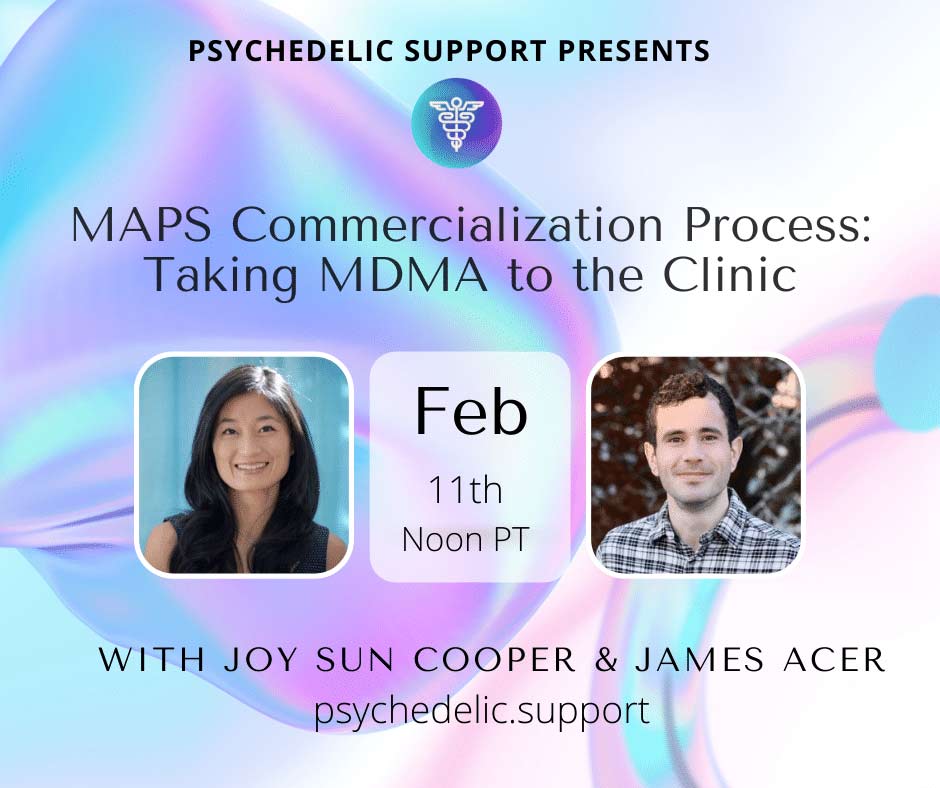
Balancing treatment protocols, equitable access, and regulatory compliance is a primary focus for the MAPS PBC as they look towards prescription status of MDMA in 2023.
Join MAPS PBC Chief of Patient Access and Head of Commercialization, Joy Sun Cooper, MBA and Chief of Staff, James Acer, BA for a presentation on balancing treatment protocols, equitable access, and regulatory compliance is a primary focus for MAPS PBC as they look towards prescription status of MDMA. We look at the road ahead and how MDMA-assisted therapy will available for healthcare providers, patients, and our healthcare system in future.
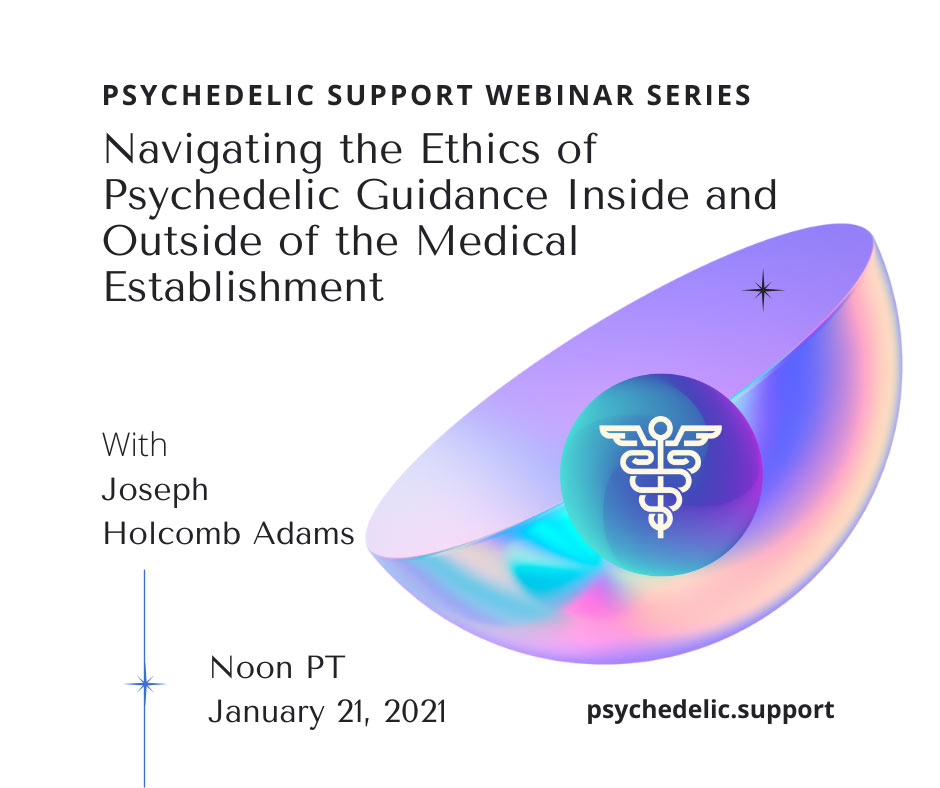
Join Psychedelic Support for an important discussion with bioethicist and Joseph Holcomb Adams, MA. We’ll explore how the four principles of clinical ethics (beneficence, non-maleficence, respect for autonomy, and justice) place specific ethical obligations on healthcare professionals who practice psychedelic-assisted psychotherapy.
2021 Past Speakers
How can we support clients after their ayahuasca ceremony? Integration is crucial to helping clients incorporate their unique experiences into the entire journey of their lives. Kerry Moran, MA, LPC offers expertise in maximizing the impact of integration work, sitting with clients in the shadows, and facilitating connection across cultures when working with ayahuasca.
Kerry Moran, MA, LPC is a graduate of the Counseling Psychology program at Pacifica University. Since then, she has worked in private practice as a present-centered psychotherapist, blending the wisdom of depth psychology (Jung, Hillman) with the non-dual teaching of Tibetan Buddhism and meditation.
Join us as Carmen Ostrander, MA, RTC, MACA incorporates a framework for therapeutic conversations informed by Narrative Therapy with expressive arts practices, to re-author stuck narratives and invite non-verbal ways of engaging with charged conscious and unconscious material.
The low dose end of the psychedelic spectrum provides a wealth of opportunities for clients and their therapists to collaborate creatively on the solving of problems. Low dose experiences create relational and psychological safety and confidence, encouraging novel approaches, perspectives and skill building as a foundation for more challenging psychedelic experiences clients may seek in other contexts.
Carmen Ostrander, MA, RTC, MACA is a Narrative and Expressive Arts therapist and supervisor based in Vancouver, British Columbia (Coast Salish Territories). Her independent practice, Square Peg Therapy, supports artists, queer and gender diverse folks with low barrier community centred support.
Want to dive deeper into the multidisciplinary nature of psychedelic-assisted therapy? Join us for a conversation as Andrew Penn, NP draws the parallels between the field of nursing, patient care, and top-notch psychedelic integration.
Andrew Penn, NP is board certified as an adult nurse practitioner and psychiatric nurse practitioner, trained at the University of California, San Francisco. His extensive training in Psychedelic Assisted Psychotherapy at the California Institute for Integral Studies led him to be a voice for nurses in psychedelic therapy.
Andrew is a cofounder of OPENurses, a professional organization for nurses interested in psychedelic research and practice. Andrew is also a study therapist in the MAPS sponsored Phase 3 study of MDMA-assisted psychotherapy for PTSD and the Phase 2 Usona sponsored study of psilocybin facilitated therapy for major depression.
Non-ordinary states of consciousness can elicit profound questions about oneself, the universe, and our place in it. By way of the Hero’s Journey, we explore common topics that emerge during psychedelic journeys and several frameworks for integrating these experiences. Dr. Ortigo describes how psychedelic integration practices can draw from evidence-based cognitive-behavioral therapy, Jungian depth psychology, existential philosophy, compassion and mindfulness practices, comparative mythology, pop culture, film, and scientific research. The presentation is an overview of his book Beyond The Narrow Life: A Guide for Psychedelic Integration and Existential Exploration.
Kile Ortigo, PhD is the founder of the Center for Existential Exploration where his work is driven by exploring personal values, spirituality, underlying emotions, and recovery from painful life experiences. Dr. Ortigo additionally serves on the CE committee at Psychedelic Support.
Chelsea Rose Pires, MA, LMFT and Sara Gael, MA, LPCC have over 17 collective years of harm reduction and peer support expertise with MAPS Zendo Project. Chelsea, a CIIS Counseling Psychology graduate has a passion for harm reduction as a therapeutic and practical approach to drug use and abuse prevention while Sara, a Naropa University graduate, served as the Director of Harm Reduction at MAPS from 2016-2020 and serves as a therapist for MAPS MDMA-assisted therapy clinical trials. Harm reduction experts, Chelsea and Sara, both serve DanceSafe and their local communities by offering harm reduction support and education. Join them as they discuss the implications of psychedelic harm reduction and peer support on mental health in a clinical state.

Dr. Beatriz Caiuby Labate (Bia Labate) is a queer Brazilian anthropologist based in San Francisco. She has a Ph.D. in social anthropology from the State University of Campinas (UNICAMP), Brazil. Her main areas of interest are the study of plant medicines, drug policy, shamanism, ritual, religion and social justice. She is Executive Director of the Chacruna Institute for Psychedelic Plant Medicines. She is Public Education and Culture Specialist at the Multidisciplinary Association for Psychedelic Studies (MAPS), and Adjunct Faculty at the East-West Psychology Program at the California Institute of Integral Studies (CIIS). She is also co-founder of the Interdisciplinary Group for Psychoactive Studies (NEIP) in Brazil. She is author, co-author, and co-editor of twenty-two books, two special-edition journals, and several peer-reviewed articles.
Joshua White is Fireside Project’s Founder and Director, the first ever peer-to-peer psychedelic hotline. With experience serving as a crisis counselor on a helpline and a psychedelic peer support volunteer at the Zendo Project, Joshua has seen firsthand the role that compassionate peer support can play in community mental health. Join him for Answering The Call: Peer Support in the Psychedelic Renaissance where he’ll discuss the landscape of supporting those having difficult psychedelic experiences in a modern and technological way.
Wesley Ryan, MD discusses Clinical Applications of Ketamine-assisted Psychotherapy Treatment. A board certified addiction psychiatrist, Dr. Ryan works as a clinician providing ketamine-assisted psychotherapy to patients with depression and PTSD. He’ll share with us the integration of behavioral and insight-oriented psychospiritual work with the psychedelic properties of ketamine.
Sara Reed, LMFT and CEO of Mind’s iHealth Solutions, a digital health company that provides evidence based and culturally responsible mental health services for underserved groups. A former study therapist on the Psilocybin-Assisted Therapy research study for Major Depression at Yale University, sub-investigator and study coordinator for the Multidisciplinary Association for Psychedelic Studies (MAPS) Phase 2 MDMA study of posttraumatic stress disorder (PTSD), and member of Chacruna’s Racial Equity and Access Committee, Sara is well versed in in the implications of psychedelic research from a multicultural perspective. Join her for an important conversation about Cultural Considerations in Psychedelic Research.

Plant Medicine Law Group, a group of women lawyers who have crossed the threshold into psychedelic law. Join them in a discussion of Emerging Legal Questions for Clinicians to learn about the landscape of psychedelic law, upcoming changes and what that means for mental health care professionals who are currently practicing psychedelic integration or hope to provide psychedelic-assisted therapy in the future.
2020 Series Schedule
Jessica Nielson, PhD, founder of The Psychedelic Society of Minnesota and Assistant Profesor at the University of Minnesotadiscusses her 10-year journey towards becoming a professional psychedelic researcher within an academic setting. In My Journey: Starting Novel Psychedelic Research at a University, Dr. Nielson discusses the challenges of navigating the terrain of psychedelic research in academia, the ethical implications of white researchers performing clinical research on indigenous plant medicines, and her thoughts on the future of psychedelic studies during the COVID pandemic.
The esteemed James Fadiman, PhD, is the foremost expert on microdosing best known for his large body of psychedelic research and classic psychedelic literature such as The Psychedelic Explorer’s Guide: Safe, Therapeutic, and Sacred Journeys. His latest endeavor with Dr. Jordan Gruber, Your Symphony of Selves: Discover and Understand More of Who We Are explores the concept of personality multiplicity and the ability to work with different selves in various situations. Join him for Microdosing Research: The Next Frontier for Clinical Trials and Therapeutics, a conversation that examines the changing landscape of microdosing research, clinical trials, and their place in therapeutic work.
Erica Siegal, LCSW is a professional harm reductionist, community organizer, MDMA-assisted psychotherapy researcher, and founder of NEST Harm Reduction. From her years coordinating the Zendo Project, she provides an experienced look at what it means to provide compassionate, trauma-informed care and tools for de-escalation during a crisis in her talk Psychedelic Harm Reduction: What Every Clinician Needs to Know.
